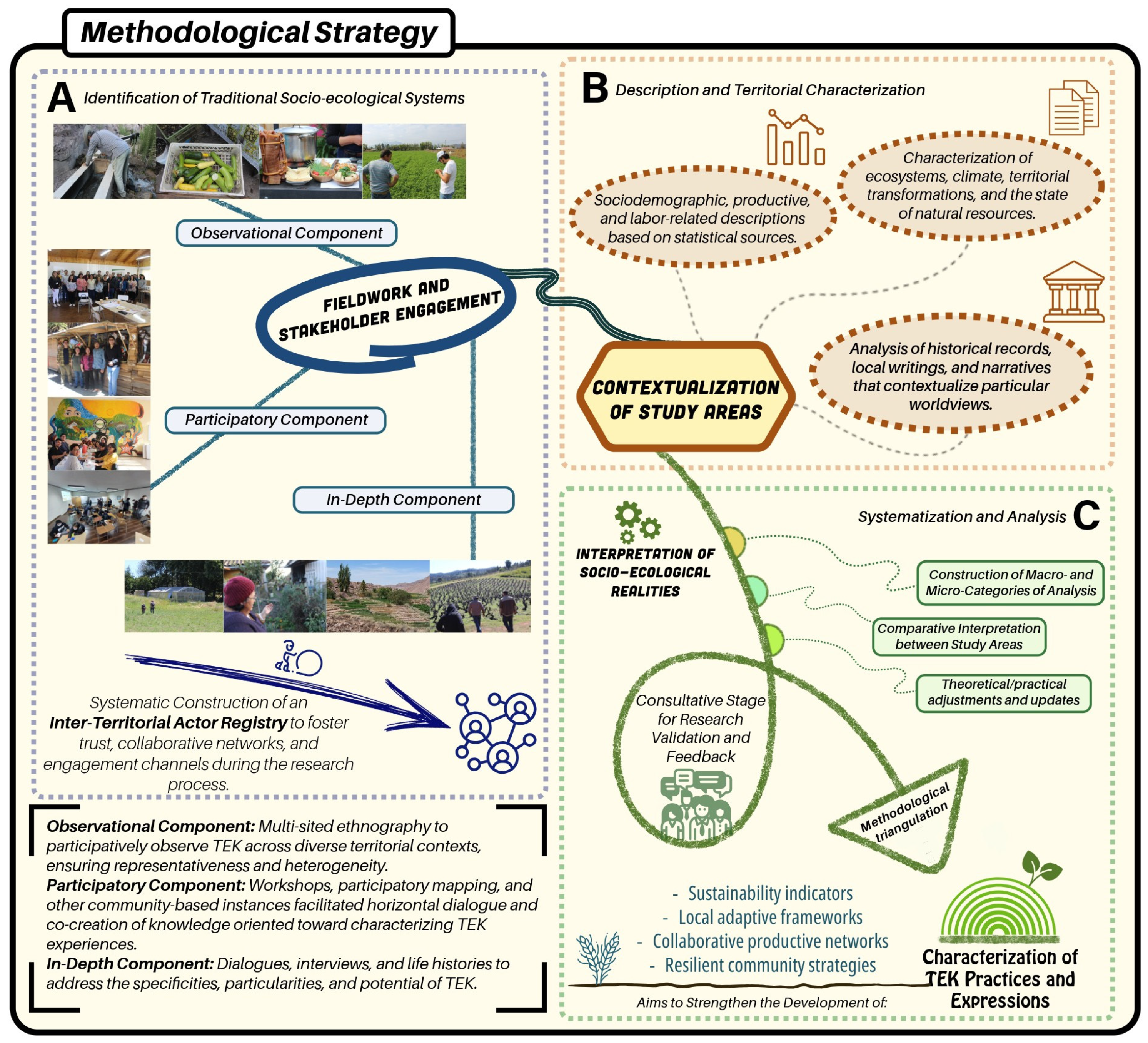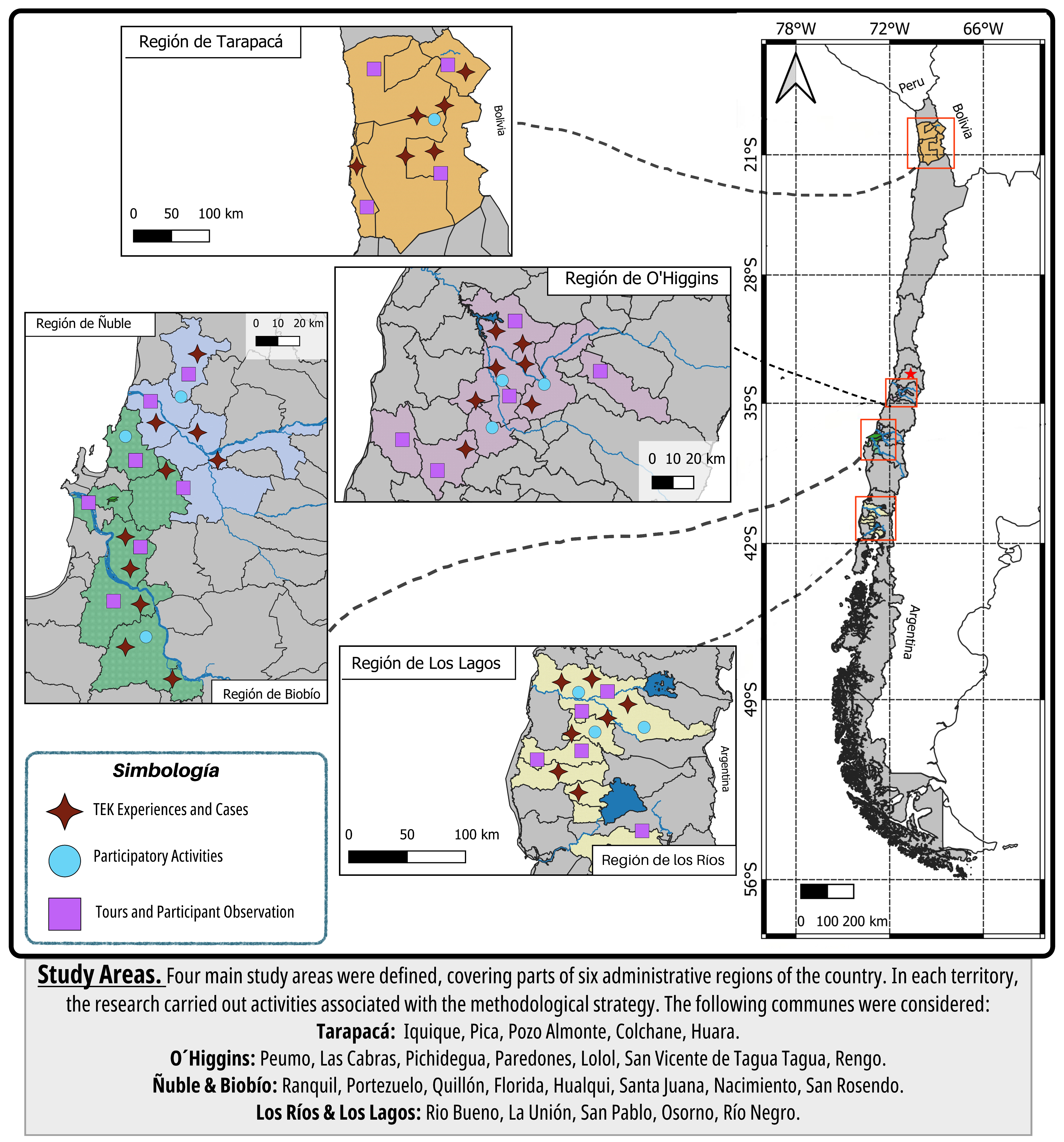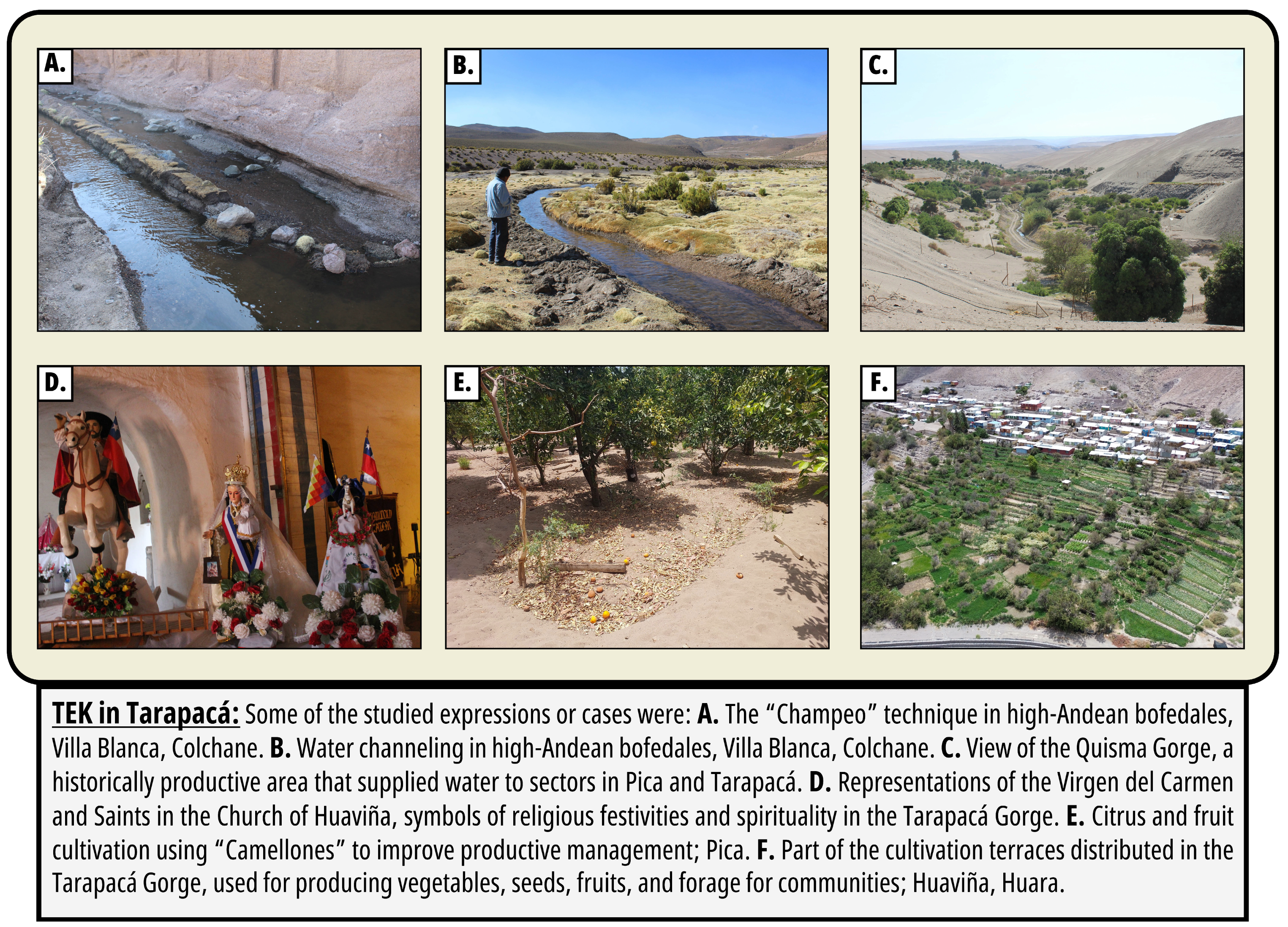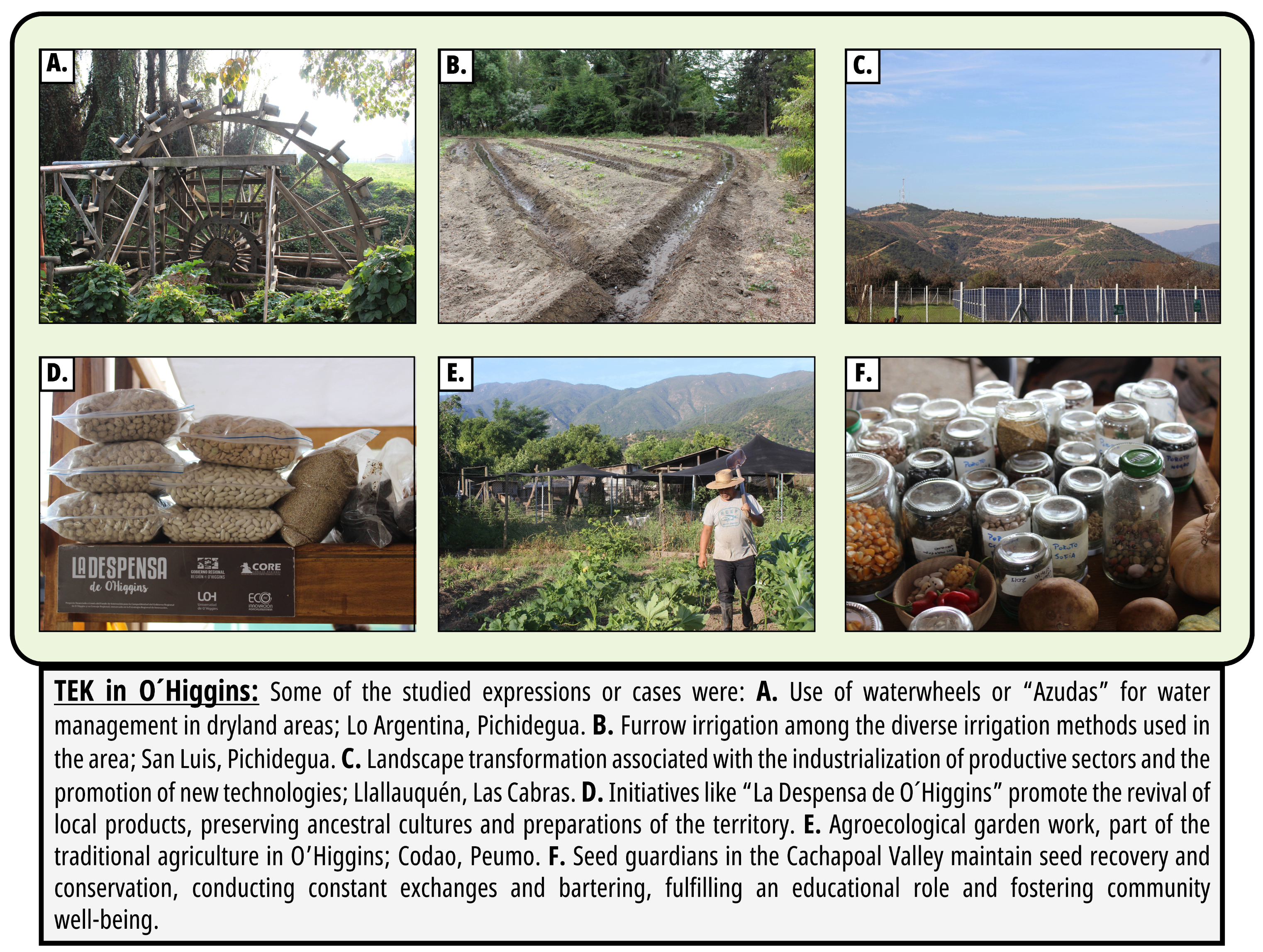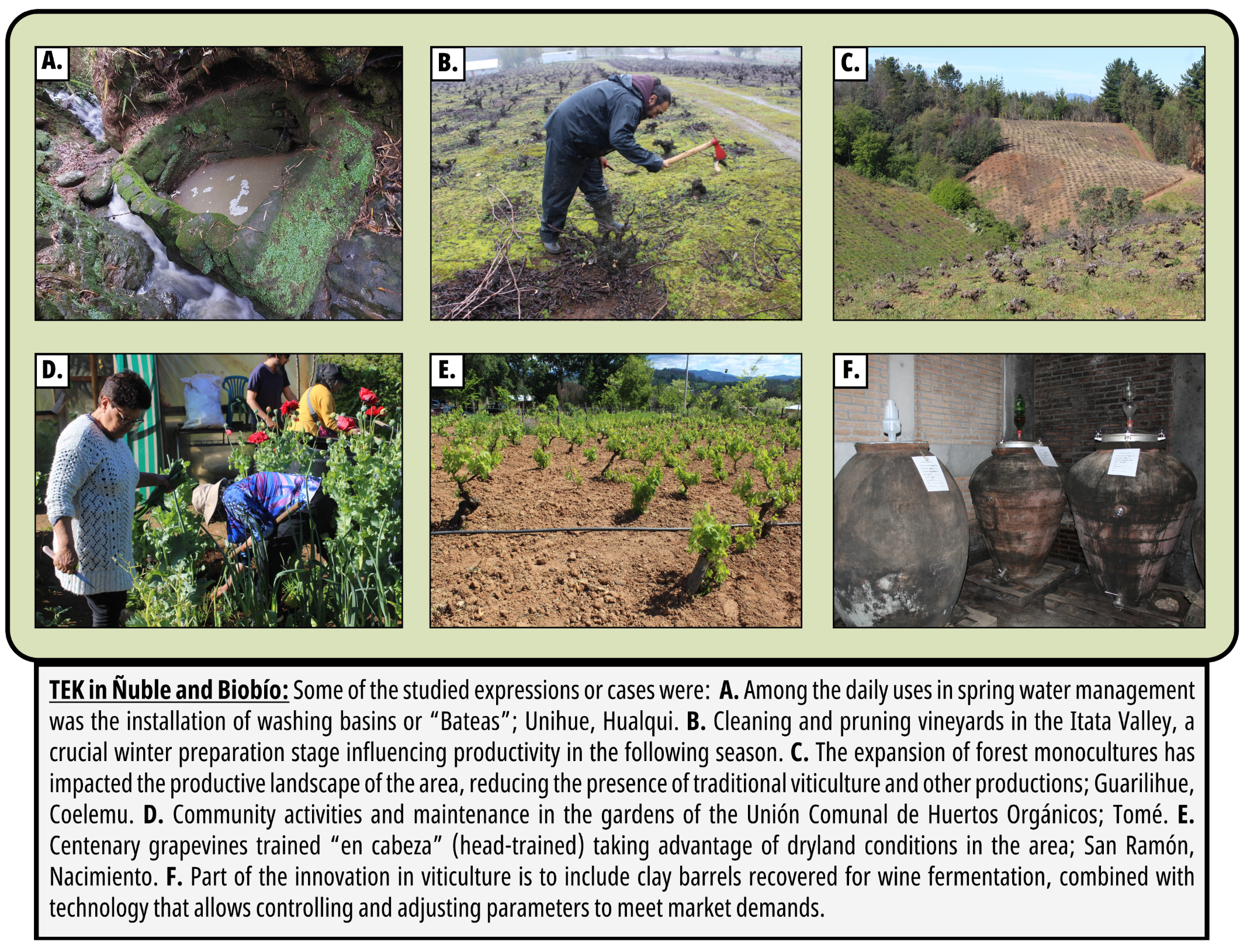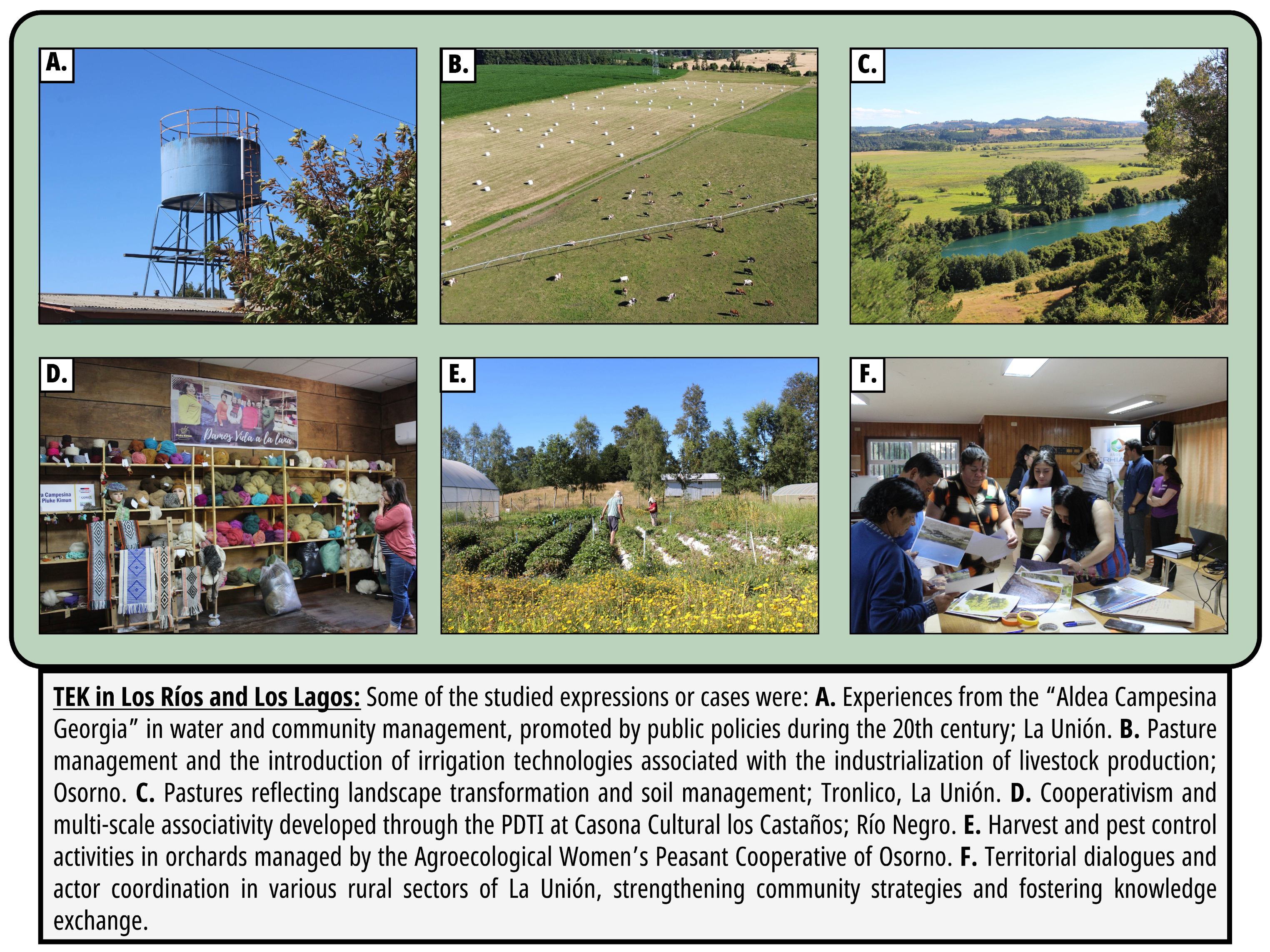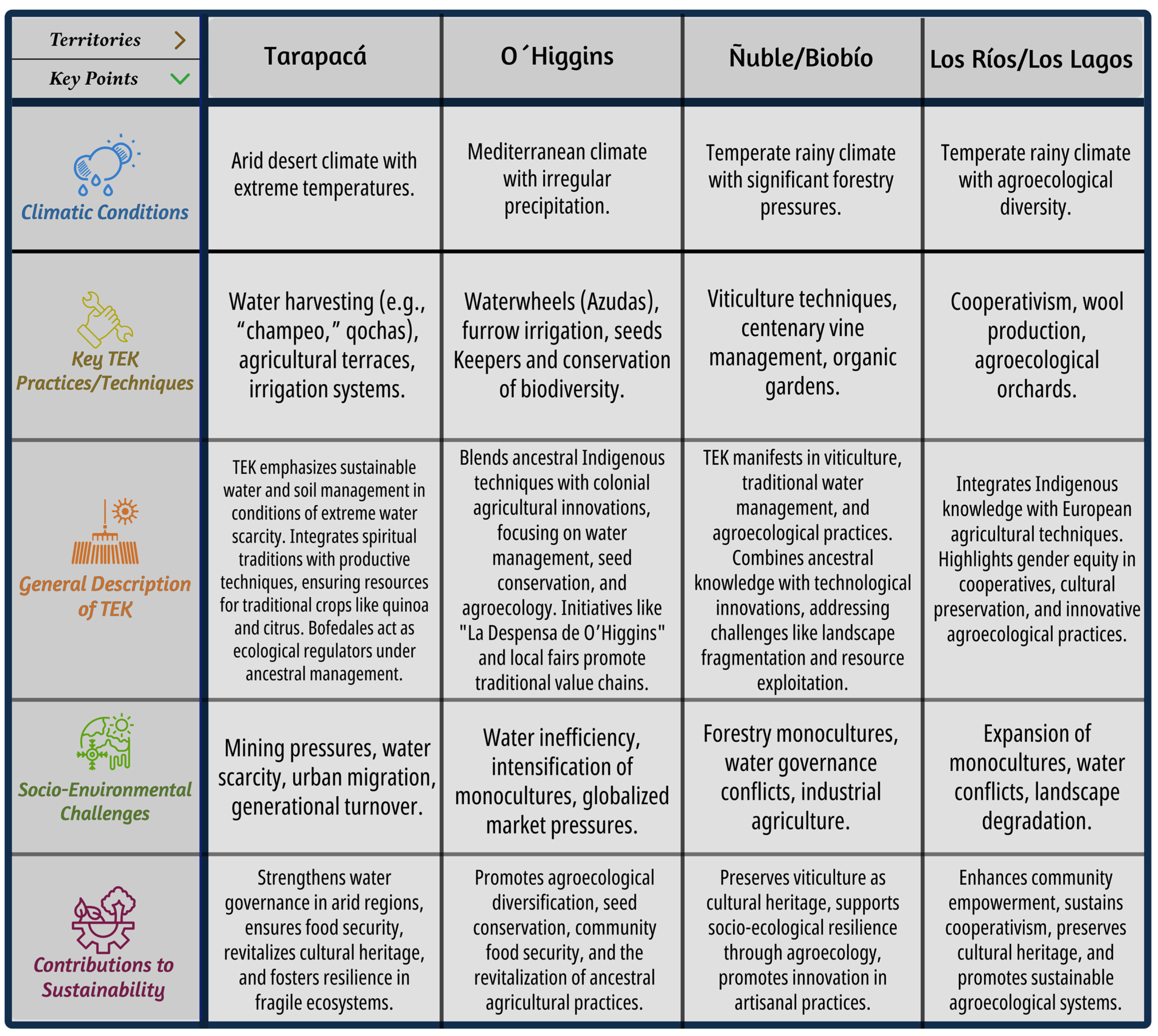Abstract
This study explores how traditional ecological knowledge in Chile can contribute to adaptation strategies within increasingly complex socio-ecological landscapes. It addresses the need for innovative approaches to knowledge production and application in the face of climate change and related crises. Through an exploratory, multi-sited qualitative methodology—integrating ethnographic observation, participatory methods, and in-depth interviews across various regions—this research identifies patterns, contrasts, and synergies in TEK practices related to water management, agroecology, community resource governance, and cultural heritage. The results show that TEK is not a static repository but rather a set of dynamic and adaptive practices and understandings shaped over centuries of interaction with heterogeneous environments. Although pressures such as migration, industrialization, resource privatization, and climatic threats endanger its continuity, TEK demonstrates the ability to integrate with scientific and political frameworks, enabling culturally relevant adaptation driven by local communities. These findings highlight the relevance of relational and transdisciplinary approaches to reduce epistemic gaps, foster cooperation, and guide more equitable, multi-level environmental governance. In conclusion, strengthening TEK’s role—through supportive policies, collaborative research, and inclusive dialogues—can enhance resilience, guide sustainable transitions, and enrich global adaptation strategies that respect local contexts and cultural diversity, thereby advancing progress toward the SDGs.
1. Introduction
In an era marked by complex, uncertain, and immeasurable challenges—environmental, social, economic, and geopolitical in nature [1,2]—there is an urgent need to broaden and diversify the search for sustainable transition and adaptation strategies for these crisis scenarios [3,4] while profoundly re-evaluating conventional paradigms of knowledge production and application. These processes require an innovative approach to knowledge theories that seeks appropriate responses to the multiple problems and challenges faced by modern society [5]. In this context, alternatives have emerged that open spaces to re-comprehend and integrate [6,7] the various expressions of traditional ecological knowledge (TEK) that have been extensively validated by Indigenous peoples and rural societies [8,9]. Historically, these worldviews have offered a systemic understanding of the landscape, diverse productive experiences, and resilient community dynamics within changing environments [10]. TEK, as a reservoir of sustainable practices and community resilience strategies, presents a valuable contribution to sustainable development goals by aligning traditional knowledge with ecological balance, food security, and equitable resource management.
The objective of this research is to explore, in an exploratory manner, TEK expressions in certain Chilean contexts, examining their local dynamics and the synergistic potential they may represent among different territorial realities. It aims to understand and foster an adaptive process, situated at multiple scales and co-constructed under a relational approach, in response to the socio-climatic crisis confronting Chilean society as well as other Latin American societies.
By focusing the analysis on different regions of Chile, we seek to understand how these TEK expressions, articulated at local scales under contrasting environmental conditions, can generate synergies between distinct territorial realities. This approach not only intends to provide a conceptual and empirical basis for better understanding TEK’s role in climate change adaptation and sustainability but also to lay foundations for future collaborative initiatives—across various scales—that strengthen its incorporation into territorial governance. Recent studies [11,12,13] underscore the importance of TEK in natural resource management and climate change adaptation, offering transformative perspectives to mitigate environmental impacts and develop culturally congruent and ecosystemically effective adaptation strategies. These efforts align directly with the overarching goals of sustainability science, which emphasize integrated, interdisciplinary approaches to address global environmental change while respecting local knowledge systems and community agency.
Co-constructing and integrating TEK experiences and practices into adaptation measures not only takes advantage of the long-standing traditions and conceptions these communities hold regarding their environment [14] but also ensures the preservation of socio-cultural, productive, and ecosystemic heritage—integral elements for advancing toward resilient adaptation [15,16]. These heritage dimensions reflect TEK’s critical role in sustaining biodiversity, promoting environmental justice, and strengthening social cohesion, thereby enriching its contribution to sustainable land-use planning and governance.
Transitioning toward these paradigm shifts allows for a relational and interdependent understanding among knowledge systems, governance dynamics, and ecosystem states, establishing points of interaction that manifest in the territory and mediate among domestic, community, and productive environments of diverse local contexts [17]. Discussions related to agroecological production systems [18], as historically resilient and community-based agricultural management experiences [19,20], reaffirm TEK as an alternative paradigm that also provides a vital response to crises of biodiversity loss, ecosystem degradation, and structural inequality fostered by agro-industrial models [21]. These insights align with the principles of sustainable development, wherein TEK contributes to ecological restoration, climate resilience, and inclusive economic frameworks that respect local knowledge.
Fostering the development of new scientific fields from the interactions of traditional and contemporary knowledge systems aims to progressively reduce the dialogical and operational gaps among decision-makers, members of productive sectors, and local actors [22]. This implies strengthening a collaborative approach—pointing toward transdisciplinary methodologies—that values co-production and involves stakeholders, horizontally incorporating Indigenous communities and rural societies into the process. Such integration not only advances sustainability science but also positions TEK as a pivotal framework for addressing global socio-environmental transformations [23,24].
All of this means advancing toward new knowledge alliances that can gather, situate, and apply these TEK discussions into concrete cases. Under this relational approach [25], these alliances can resiliently weave collaborative processes capable of overcoming cultural, political, and institutional barriers [26], consolidating spaces for TEK within governance and land-use planning processes, and preventing its degradation and loss in the face of multiple threats [27]. These efforts reinforce TEK’s role as a cornerstone of sustainability, linking traditional practices with contemporary challenges to build adaptive, inclusive, and resilient pathways for the future.
2. Theoretical–Conceptual Review
Briefly, this review aims to emphasize the fundamental role of traditional ecological knowledge (TEK) in discussions regarding adaptation and mitigation in contemporary crisis scenarios.
2.1. Traditional Ecological Knowledge: Expanding the Pathways for Adaptation in Times of Crisis
The wide array of TEK expressions represents centuries of community interactions, learning, and observation, brought together by Indigenous peoples and rural societies who systematically adapted to their ecosystems, encapsulating practices, beliefs, and techniques for their survival and sustainability [28].
These knowledge systems [29,30,31] are characterized by a holistic and systematic understanding of the world [32,33], a diversity of trades, practices, and techniques [34,35], and a cohesive dynamic passed down through generations [36]. Such dynamics are reflected in the cultural institutions that peoples and communities have built from their worldviews [37]. Historically, communities have maintained a close relationship with their environment [38], enabling them to undergo profound adaptive processes in response to local contextual changes, progressively adjusting their productive management methods and governance strategies around hydro-productive–ecological management of their surroundings [18,39].
The adaptability and dynamic nature of TEK [40] enable contributions to the design of ecologically viable adaptation and mitigation strategies that are also pertinent to diverse local socio-cultural realities [41,42]. TEK complements scientific methods with nuanced data and understandings of environmental changes often overlooked by conventional science [22]. This integrative path of various forms of knowledge requires moving beyond the historical perspective—rooted in traditional science—of “instrumentalizing” TEK expressions [43,44], thereby avoiding compartmentalizing their integral understanding of the environment or reducing them to seemingly irrelevant perceptions in decision-making processes [45,46].
2.2. Toward a Relational Society–Nature Vision Through a Reinterpretation of TEK
Understanding and integrating TEK into contemporary adaptive processes requires transcending the fragmented views that have historically dominated knowledge management [14]. It calls for advancing toward a relational approach that connects these traditional expressions to the need to rethink the relationships between society and nature [47,48]. In various contexts, the relational approach [49,50] is gaining relevance, converging diverse cooperative initiatives into collective efforts to replicate and learn from these experiences at multiple scales [51].
The relational approach in sustainability science emphasizes the dynamic and interdependent relationships among human and non-human actors. Rather than treating these as isolated components, this perspective focuses on the interactions and interconnections that shape socio-ecological systems [52,53]. This approach aligns with the idea that sustainability outcomes are deeply rooted in the quality and nature of these interactions, where communities, ecosystems, and governance structures are inherently interlinked. These relationships form the foundation of their adaptive and resilient potential [54,55,56].
For instance, in the context of TEK, the relational approach highlights the embeddedness of knowledge systems within cultural practices, spiritual beliefs, and ecological interactions. Indigenous relational ontologies, as Whyte [26] has explored, conceive humans as integral components of ecosystems, fostering stewardship practices that sustain both biodiversity and cultural identity. This framework transcends reductionist views, providing a more nuanced understanding of how TEK can contribute to resilience and sustainability. By applying this approach in practice [57,58], significant advancements have been made in the co-management of natural resources, territorial planning, and transitions toward sustainable models [59,60]. Examples from global experiences [61,62,63,64,65] demonstrate that co-constructing knowledge through reciprocal and respectful interactions with Indigenous worldviews can guide transformative and just sustainability pathways [66,67,68].
Knowledge alliances, on the other hand, represent structured collaborations between diverse epistemological systems—scientific, local, and Indigenous—to address complex socio-environmental challenges. These alliances are not merely aggregations of knowledge but dynamic, co-creative processes aimed at fostering synergies across epistemic traditions. As Puri [69] explains, knowledge alliances facilitate the integration of context-specific Indigenous knowledge with scientifically codified practices through participatory frameworks and mediating tools, such as boundary objects, which enable mutual understanding and collective problem-solving.
2.3. Co-Construction of Knowledge Alliances from an Inter- and Transdisciplinary Perspective
The global distribution of TEK [70] offers a unique opportunity to establish wide-ranging dialogues among worldviews and practices, enabling the integration of trades, techniques, and experiences into a common adaptive framework [71]. On this path, inter- and transdisciplinarity emerge as essential epistemological approaches [72,73,74], guiding the development of new sub-disciplines toward creating adaptation strategies and plans that understand the complexity of socio-ecological interactions [75] as well as building truly collaborative and horizontal alliances [76,77].
Knowledge alliances, grounded in reciprocity and trust, promote horizontal dialogue that not only integrates diverse worldviews but also creates innovative spaces for formulating inclusive and equitable policies [78]. These alliances allow for the successful replication and adaptation of strategies in different contexts, strengthening sustainability and socio-environmental justice [79]. The co-construction of knowledge, under an inter- and transdisciplinary epistemology [80], provides a robust framework to address contemporary challenges, integrating TEK into a relational approach that enriches both the scientific discourse [81] and public policy formulation.
This approach presents significant methodological challenges, such as the need to slow down certain stages of the investigative and reflective processes [82] to promote deep integration of diverse worldviews [83,84], further strengthening trust-based relationships among actors at different scales and in various contexts. At the same time, there are opportunities to reimagine certain strategies in local decision-making and territorial management [85], seeking solutions that are not only ecologically viable but also culturally resonant and socially equitable [86].
The success of these alliances lies in their ability to articulate multi-scalar mitigation and adaptation strategies that respond to local realities but also have global resonance and projectable longevity [87].
2.4. Chile and the Socio-Environmental Crisis: A Diverse Setting for Reconceiving TEK
Chile’s great ecosystemic and cultural diversity [88] offers a broad and interesting scenario for the study and understanding of TEK [89]. Indigenous peoples such as the Mapuche or Aymara [90,91], together with rural agrarian societies formed in the central regions [92,93,94], have developed intricate knowledge systems that have been fundamental for environmental management [95,96,97]. They have adapted to their daily practices, ecosystemic particularities, and territorial transformations [98,99,100]. These dynamics, deeply rooted in local culture, constitute a strategic resource for Chile to more resiliently address contemporary environmental problems and challenges, such as the severe water crisis [101] or the increase in extreme events [102], including floods and wildfires [103].
Indeed, the country faces a scenario of growing environmental vulnerability [104], intensified by the impacts of climate change [105]. The water crisis—marked by a prolonged megadrought and overexploitation of water in various territories [106,107]—is a clear example of these threats, affecting both biodiversity and the sustainability of traditional knowledge systems [27,108] and community livelihoods. This scenario is further aggravated by certain territorial conflicts and tensions [109,110], along with various migration processes [111,112], putting the country’s biocultural richness at risk [113] and progressively eroding the intergenerational transmission channels of TEK itself [90].
However, Chile has taken steps toward safeguarding TEK and integrating it into contemporary environmental management. For instance, national programs like the Indigenous Territorial Development Program (PDTI) and PRODESAL, implemented by INDAP (Institute for Agricultural Development), provide financial and technical support to Indigenous and rural communities to sustain traditional agricultural practices while addressing environmental challenges. Similarly, legal frameworks like the Environmental Framework Law (Ley N° 19.300) emphasize the sustainable management of natural and cultural heritage, providing a policy basis to protect TEK practices. Initiatives like the revitalization of the Itata Valley or the Denomination of Origin programs for traditional products further illustrate how TEK can merge with modern governance models to promote resilience and sustainability.
Adopting a relational and transdisciplinary perspective in managing Chile’s socio-environmental crisis offers another pathway to address the threats, strengthening these traditional knowledge systems. This approach requires reciprocity and (re)establishment of trust between those who carry or preserve traditional knowledge and those who actively participate in decision-making [114,115]. For example, collaborative initiatives like La Despensa de O’Higgins demonstrate how community-based efforts can successfully bridge TEK and modern market demands, ensuring the continuation of sustainable practices. Such integration not only reinforces the socio-ecological resilience of local communities but also contributes to consolidating new models to resiliently tackle complex environmental problems on a global scale [116,117].
3. Methods
This research adopted an exploratory, multi-sited, and predominantly qualitative methodological strategy, structured into three main stages (Figure 1), aimed at characterizing and interrelating various TEK expressions in four areas representative of Chile’s ecosystemic and socio-cultural diversity. The inherent complexity of TEK systems [32], their intricate relationship with territory, and community dynamics required an adaptive research strategy capable of capturing the specificities and nuances of this knowledge in particular local contexts [118,119].
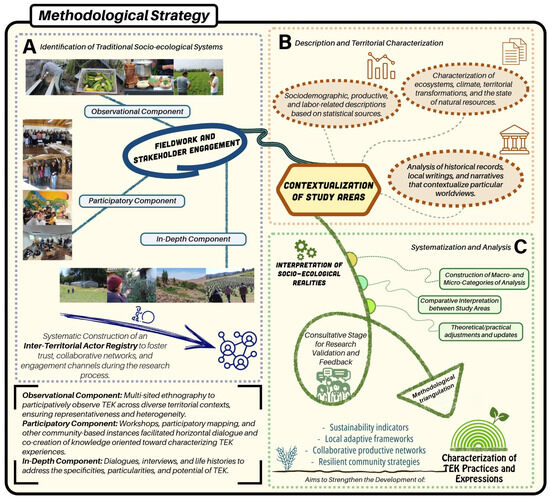
Figure 1.
Methodological strategy.
3.1. Identification of Actors and Traditional Socio-Ecological Systems
The central and core stage of this research involved the integration of ethnographic techniques, participatory methodologies, and an in-depth exploration of each territory’s narratives. These processes also entailed ongoing engagement and interaction with a variety of actors in the studied territories, consolidating an inter-territorial roster of actors connected to TEK experiences. This made it possible to envision future opportunities for collaboration and knowledge exchange.
3.1.1. Observational Component
An initial approach under a multi-sited ethnographic framework [82,120] made it possible to study TEK systems in different territorial contexts, scalable under a common thematic–analytical framework [121,122]. This process also centered on conducting participant observation [123,124], immersing the researcher in the daily practices and rituals of the studied communities. Such immersion enabled a holistic and contextualized understanding of the environment and the dynamics of its natural resource management [35,125]. Over a three-year period, visits were made to each study area during different seasons, productive periods, and key community dates, building and strengthening relationships with key actors, institutions, and significant TEK experiences [126]. This iterative approach effectively integrated the design of instruments and data collection techniques [127].
3.1.2. Participatory Component
Expanding the research scope through participatory instances proved fundamental for collaboratively strengthening a TEK characterization that not only reflected a scientific perspective [128] but also democratized the knowledge production process [129]. Ensuring applicability and scalability to different local contexts, this involved community forums, workshops, participatory mapping, shared meals, and collaboration in tasks related to water and land management. These activities fostered horizontal dialogue with the study participants [130,131]. Not only did these activities validate TEK’s local relevance, but meaningful participation also added a special dynamic to this research. It enriched the central aspects of this study and facilitated knowledge exchange among the involved actors [132], closing epistemological gaps and strengthening mutual trust [133,134].
3.1.3. In-Depth Component
The third component focused on deepening the understanding of TEK through semi-structured interviews with more than 20 key actors [135,136], delving into their life histories and experiences. This was complemented by extensive visits to community and productive environments, gaining a more detailed knowledge of the particularities, differences, and adaptive capacities within TEK expressions [137]. By continuously iterating between collected data, recorded narratives, and analyzed theory, following the constant comparative method [138], it became easier to identify patterns, categories, and variations among the different studied territories [139,140]. This facilitated the coding process and guided the subsequent analysis and inductive theory-building around TEK cases.
3.2. Description, Contextualization, and Territorial Characterization
This stage involved analyzing and reviewing secondary data to complement previously conducted qualitative work. It allowed for contextualizing and enriching the initial findings, strengthening this research’s conceptual frameworks, and adjusting the thematic guidelines used in the fieldwork [118]. Moreover, this approach broadened the research scope in both longitudinal and geographical terms, contributing to a more in-depth analysis and minimizing the burden on participants [141].
The central objective was to delve into the historical–cultural, socio-demographic, ecosystemic, productive, and labor dimensions of the study areas. This was achieved by using official statistical sources, historical records, and previous studies. Employing secondary data also offered significant advantages for the research process, such as saving time, accessing large volumes of information, and reducing data collection costs [142].
3.3. Systematization, Analysis, and Interpretation of Socio-Ecological Realities
At this stage, data were systematized, analyzed, and interpreted, applying grounded theory principles [138,143,144]. Triangulating methods and data sources strengthened the validity of results, allowing for the comparison and corroboration of qualitative findings with the quantitative and contextual information obtained in the previous stage [145]. Continuous iteration between theory and empirical data adjusted and enriched the research’s conceptual framework [146,147,148]. This approach made it possible to address problems by considering scale and time from the practices shaping the studied scenarios. We progressed in constructing macro-categories of analysis based on different studied realities, establishing comparisons and particularities in TEK experiences obtained from dynamic interactions with communities and their socio-ecological, productive, and cultural environments.
Community validation through workshops, feedback sessions, and result-sharing provided cultural and human sensitivity, utility, and relevance to the involved communities [129]. Simultaneously, this process strengthened trust and promoted the communities’ appropriation of generated knowledge, integrating it into their daily practices. In this way, the practical application of the findings with future perspectives was made possible.
3.4. Ethical Considerations
A pertinent ethical protocol was implemented, including informed consent from each participant, data confidentiality, and the commitment to return results to communities in a comprehensible and useful manner [149]. Sensitive information was anonymized, and the rights and dignity of all participants were respected. Additionally, a gender perspective was integrated, and the inclusion of diverse voices at all levels of this study was promoted [150].
Building trust was fundamental to the success of this research. The flexibility of the methodological approach allowed for adjusting procedures according to participants’ needs, sensitivities, and worldviews, ensuring ethical, respectful, and inclusive research [119]. This ethical commitment not only strengthened this study but also increased its impact and reach by fostering lasting and collaborative relationships with communities [133].
4. Study Areas
Chile, a country stretching approximately 4300 km from the Atacama Desert in the north to the austral regions of Patagonia, is a paradigmatic example of ecological, climatic, and geomorphological diversity [88]. This longitudinal diversity underpins the distinct socio-ecological interactions that shape territorial management and traditional knowledge systems across its regions. This research focuses on four study areas—Tarapacá, O’Higgins, Ñuble-Biobío, and Los Ríos-Los Lagos—selected based on theoretical and practical criteria that prioritize representation of heterogeneous territorial, cultural, and ecological contexts (Figure 2). These regions not only reflect diverse environmental conditions but also illustrate the varied interactions between traditional ecological knowledge (TEK), governance frameworks, and productive practices throughout Chile’s history.
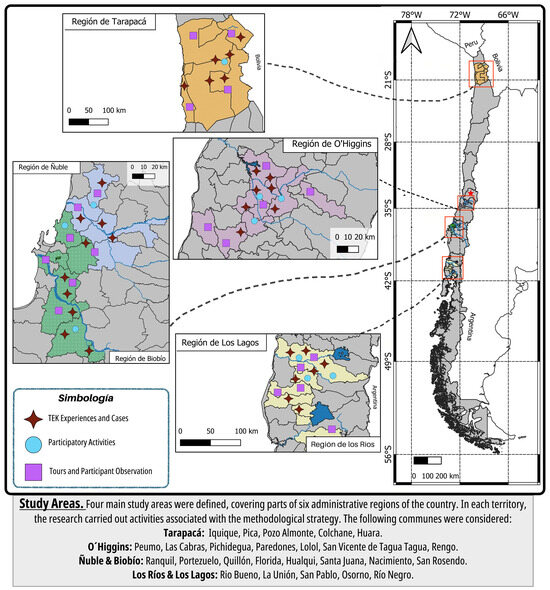
Figure 2.
Study areas.
In recent years, the country has faced an unprecedented water crisis, marked by a persistent megadrought that has profoundly altered water availability [107]. Overexploitation of aquifers, the expansion of exotic forest plantations, and agricultural intensification have placed pressure on water sources, raising tensions and conflicts among productive sectors, rural communities, and local ecosystems [110]. This delicate scenario is further aggravated by institutional limitations, legal tensions, and epistemological barriers that hinder the transition toward more equitable water governance [101].
The selected study areas encompass a geographic diversity that reflects the main climatic and ecosystemic characteristics of Chile. The Tarapacá region, in the extreme north, is characterized by a desert climate with minimal rainfall and extreme temperatures [151]. High-Andean ecosystems, such as Bofedales, play a crucial role in water management and biodiversity preservation, being fundamental to local communities’ resilience in the face of water scarcity. This region also presents a marked altitudinal transition, from the arid coast to the heights of the Altiplano.
In contrast, the O’Higgins, Ñuble, and Biobío regions in central and southern Chile experience Mediterranean and temperate rainy climates, with key fluvial and agricultural ecosystems. Irregular precipitation patterns and water overexploitation in the Cachapoal and Tinguiririca rivers in O’Higgins, as well as the fragmentation of the Itata and Ñuble rivers, have affected the sustainability of productive and ecological systems. In Biobío, the expansion of forest monocultures and the increase in wildfires exacerbate biodiversity conservation and sustainable land management issues, also complicating governance in significant basins such as that of the Biobío River. The Biobío is one of the country’s main water bodies and poses a series of challenges in terms of water governance, continuously interacting with industrial activities, hydroelectric projects, numerous stakeholders, and traditional productive experiences [152]. Finally, in the Los Ríos and Los Lagos regions, the temperate–rainy climate, combined with deforestation, changes in rainfall patterns, landscape transformation through land subdivision, and land-use changes, all increase the territory’s vulnerability, affecting agricultural production and the preservation of fluvial systems.
Challenges in these regions include deforestation, shifting rainfall patterns, and fragmentation due to land subdivision, all of which heighten vulnerability to climate change. However, the resilience of TEK practices, such as sustainable livestock grazing and soil conservation techniques, demonstrates the capacity of local communities to adapt. Moreover, the prevalence of cooperatives, such as those focused on dairy production or wool processing, illustrates how traditional practices can be integrated into modern economic frameworks, creating opportunities for knowledge exchange and innovation in sustainability.
The selected regions were chosen based on their ability to represent the ecological and cultural diversity of Chile while reflecting key socio-ecological dynamics. The criteria included the following:
- Ecosystemic Diversity: Capturing distinct climatic zones (arid, Mediterranean, and temperate) to reflect the variability of TEK applications across different environmental contexts.
- Historical Significance: Highlighting regions with pivotal roles in Chile’s socio-economic development, from the Andean highlands’ early agricultural innovations to the colonial and post-independence transformations of the central valleys and southern territories.
- Functional Representation of TEK: Showcasing a range of TEK practices, including water management, agroecology, and hybridized land-use systems, to illustrate how traditional knowledge informs sustainable practices across different landscapes.
- Governance Complexities: Focusing on regions with active socio-environmental conflicts or collaborative governance initiatives to explore how TEK interfaces with policy and management frameworks.
5. Results
5.1. Tarapacá: TEK Conservation in an Arid Context
In Tarapacá, TEK expressions represent a remarkable model of sustainability in one of the world’s most arid ecosystems (Figure 3). The practices developed, maintained, and transmitted by peoples (Aymara, Quechua, and Diaguita, among others present in the area) reflect centuries of adaptation to their environment, practicing efficient and sustainable natural resource management [100]. Traditional productive systems in the region are deeply integrated with the landscape, combining agricultural, pastoral, and water-related practices with cultural and spiritual expressions that reinforce social cohesion.
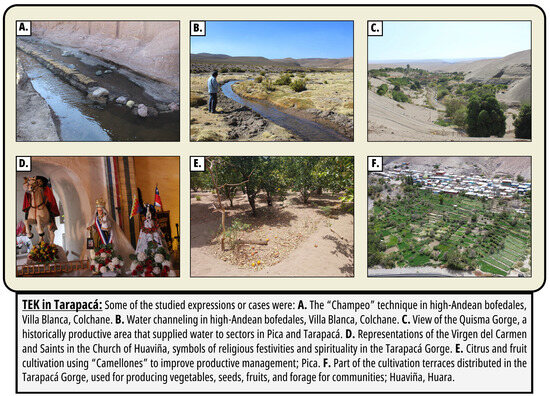
Figure 3.
TEK in Tarapacá.
Water management in this area is characterized by the application of a variety of traditional techniques and practices fundamental to sustaining both productive and community activities (Figure 3B). High-Andean Bofedales, key ecosystems for water regulation in the Altiplano, support a range of productive and cultural activities. In these ecosystems, traditional techniques such as “champeo” (Figure 3A) are employed, involving monitoring, channeling, and redistributing water to retain and release it during dry seasons, thereby facilitating camelid grazing and crop viability in critical periods. Additionally, sowing and harvesting water practices, based on rainwater capture and storage, complement other water management strategies, enabling communities to anticipate climatic variability. These practices have parallels with water collection systems in Tunisia and Peru, evidencing their potential replicability in other arid regions [153,154].
Another crucial aspect of water management is the development of irrigation systems that take advantage of the landscape’s morphology, such as the ancestral installation of “qochas” in places like Pica, Matilla, and the Quisma Valley. Qochas are water reservoirs collecting runoff and rainwater, increasing water availability for agricultural use. These systems have evolved historically, gradually complemented by some canalization and infiltration technologies introduced by Spanish colonizers who leveraged the area’s productive potential during the 16th and 17th centuries [98,155].
In this area, another fundamental TEK component is the ancestral use of agricultural terraces, a practice widespread throughout the Andes [91]. These terraces, extensively found in sectors like the Tarapacá Gorge (Figure 3F), have been essential for maximizing moisture retention, minimizing erosion, and preserving fertile soils—crucial factors to produce crops such as quinoa, oregano, citrus, Pascua pear, and quince (Figure 3F). However, currently, these terraces are not being used at their full capacity. The pressure from extractive activities, especially mining, has negatively affected crop maintenance and productivity. Additionally, generational turnover among farmers hinders the continuity of agricultural activities, since younger generations often migrate to urban coastal areas in the region. Despite these challenges, there is potential and capacity to revitalize agricultural terraces through support programs and the promotion of sustainable practices. Restoring these structures would not only contribute to food security and local economic development but also allow the preservation of the region’s cultural heritage and ecological landscape. Studies in other Andean areas have shown that rehabilitating agricultural terraces can be successful when TEK is combined with modern techniques and the local community is actively involved, suggesting that similar initiatives could be implemented in Tarapacá to reverse the current trend and strengthen agricultural resilience. Comparable to rice terraces in China [156] and dryland systems in Thailand [157], these practices demonstrate their effectiveness in different agroclimatic contexts and their potential integration into global adaptation strategies.
Some remnants of Tarapacá’s viticultural tradition remain structurally embedded in the development and establishment of the area’s settlements. In Matilla, precisely, the production of wines such as Oporto-type, developed between the 16th and 18th centuries, once achieved international recognition. Although this practice declined after the War of the Pacific due to strategic and developmental factors that led to the expropriation of water from peasants in the Quisma Valley (Figure 3C), there are currently inter-institutional collaborative initiatives aimed at reviving these crafts [97]. These initiatives seek new productive niches through the revitalization of these traditions, integrating modern techniques with native varieties and promoting sustainability through wine tourism.
The cultural aspect of TEK is inseparable from its spiritual dimension. Various religious festivities (Figure 3D) distributed among the valleys and gorges (such as La Tirana or San Antonio in Matilla) symbolize a religious and cultural syncretism that reinforces elements for the intergenerational transmission of traditional knowledge. These celebrations act as spaces to reactivate community dynamics and exchange knowledge and practices with the new generations who, during these festivities, return to their traditional villages.
5.2. O’Higgins: Agroecology, Water, and Seeds—Sustaining Ancestral Knowledge
Historically, this area has been a key agricultural center for Chile, with a rich heritage dating back to pre-Hispanic and colonial periods [92,158]. During the hacienda period, a mixture of knowledge about valley management was consolidated, where the syncretism between ancestral practices—of Indigenous peoples—and European practices—brought by Spanish colonizers—gave rise to unique agricultural systems. TEK in this region (Figure 4) has been nurtured by this history, consolidating over generations of peasants who have preserved and adapted traditional practices, both in landscape management and in maintaining spaces and productive methods at different scales.
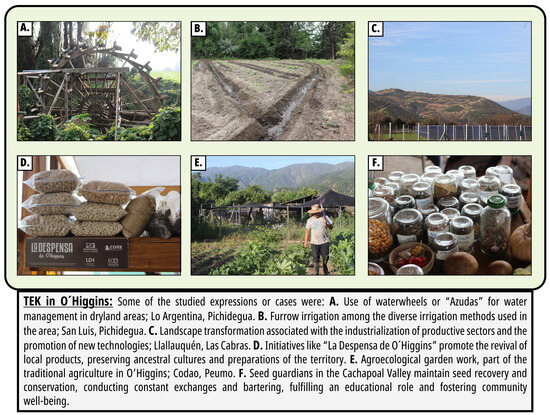
Figure 4.
TEK in O’Higgins.
A representative example is the use of “Azudas” in Larmahue, commune of Pichidegua (Figure 4A); they are ancestral waterwheels introduced during the colonial period, still used to lift water and irrigate fields in dryland areas. These structures have been maintained and rebuilt by local artisans, reflecting the integration of traditional techniques with current needs. The preservation of this system is possible thanks to the active role of peasantry in conserving these techniques, including trades such as carpentry and blacksmithing, essential for the construction and maintenance of azudas. Several studies reaffirm and explore in depth the active role of these irrigation systems in the region’s development and the maintenance of community dynamics [93,95,96].
In the Cachapoal and Rapel valleys, agriculture rooted in family farming conserves ancestral agroecological practices (Figure 4E), such as refined pruning and artisanal food preservation methods. However, less water-efficient techniques persist, such as furrow or flood irrigation (Figure 4B), as well as seasonal soil burning. Although traditional, these practices lack the necessary efficiency in the face of the current water crisis and the growing demand for sustainable production.
Seed guardians in the Cachapoal Valley represent a strategic dimension of TEK in the area (Figure 4F). Cases such as that of Mrs. Ana Yañez Antillanca—an agroecological gardener, researcher of ancestral cuisine, and community educator—through the conservation, selection, and improvement of ancestral crop varieties not only contribute to the genetic resilience of agricultural systems but also reinforce the socio-cultural fabric around the use, preparation, and exchange of foods. Her holistic perspective integrates the safeguarding of plant species with culinary practices, oral traditions, and the strengthening of local networks, evidencing that TEK is not a mere static repository but a dynamic field capable of adapting and generating productive alternatives in the face of climatic variability and pressures on water resources. The work of these seed guardians transcends the productive sphere to become a pedagogical and cultural reference, expanding the repertoire of options available to communities and enabling innovative ways to articulate TEK as a key tool in transitioning toward sustainable and socially just forms of global adaptation. Through local markets and fairs, these guardians’ agroecological dynamics have recently been strengthened, allowing for the expansion of spaces for exchange, intergenerational dialogue, and the productive capacity of small farmers. Community initiatives such as “La Despensa de O’Higgins” (Figure 4D) have revitalized the production and consumption of traditional foods, promoted food security, and strengthened the valleys’ cultural identity. The impetus of this initiative allows us to envision the development of these small traditional value chains in other contexts.
Viticulture is another fundamental practice in O’Higgins. During the hacienda period, vineyards expanded, and vine management techniques were transmitted from generation to generation. This knowledge has allowed maintaining the quality and diversity of local varieties, highlighting the Cachapoal Valley and its revitalization of grape varieties like Carmenere. Traditional pruning is not only an agricultural technique but also a niche for exchanging knowledge among local communities. Several actors emphasize the importance of the intergenerational transmission of this knowledge and how industrialization and the introduction of new crops have posed greater difficulties in preserving it.
TEK faces challenges such as agricultural intensification, the industrialization of traditional niches like wine, and the expansion of monocultures and solar fields on fertile lands, creating a fragmented territorial matrix (Figure 4C). This landscape transformation dynamic concentrates resources and displaces ancestral practices, while global market adaptation limits interaction between generations, reducing opportunities to share knowledge.
5.3. Ñuble and Biobío Regions: Socio-Ecological Adaptation Under Territorial and Productive Pressures
In these regions, whose administrative separation in 2018 has introduced new governance dynamics, TEK expressions face a complex scenario marked by tensions between ancestral practices and contemporary productive pressures [159,160]. On one hand, the intensive expansion of forest monocultures (pine and eucalyptus) has made water access difficult, altered soil fertility and productivity, fragmented the landscape, and directly affected rural communities along with their traditional agricultural dynamics [161]. On the other hand, the Biobío River basin—one of the country’s most significant—serves as a strategic axis for multiple actors, making it even more complex to implement actions that enhance socio-ecological resilience.
In the face of these scenarios, TEK manifests in agroecological practices, centuries-old trades, and adaptive techniques that aim to sustain the zone’s productive and cultural diversity (Figure 5). The Itata Valley, for example, is renowned for its viticultural tradition with grape varieties such as País or Moscatel de Alejandría, managed (Figure 5B) through manual pruning, fermentation with native yeasts, and the use of centennial vines—more than 200 years old in some sectors like Portezuelo or Nacimiento (Figure 5E). This knowledge, transmitted through generations, has found new ways to persist by recovering earthenware jars for winemaking and the technological control of fermentation parameters (Figure 5F). The balance generated between ancestral heritage and contemporary innovation reveals TEK’s potential to address climatic and commercial challenges, preserving a unique territorial and patrimonial identity. Local studies reaffirm Itata’s historical, productive, and cultural value [162,163]; international experiences, such as climate change innovations in Australian wine regions, also show how regions can adapt to environmental challenges through sustainable practices and the conservation of cultural heritage [164].
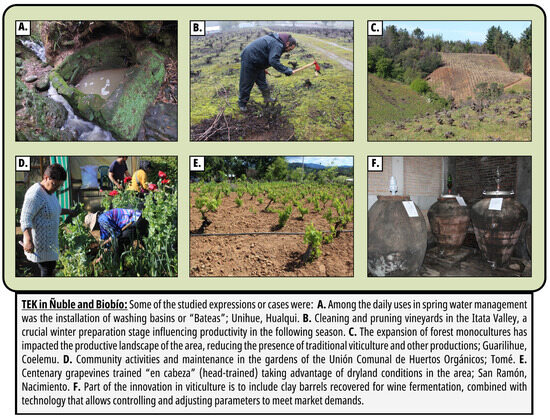
Figure 5.
TEK in Ñuble and Biobío.
In rural sectors of Hualqui or Florida, water management stands out through the utilization of springs, ravines, and small traditional infrastructures (Figure 5A), supporting domestic tasks and maximizing the efficiency of available water resources. These practices, together with the recovery of community spaces like gardens, provide bases to move toward food self-sufficiency and the strengthening of the social fabric. The “Unión Comunal de Huertos Orgánicos” (UCHO) in Tomé (Figure 5D), for instance, illustrates how citizen participation revitalizes the maintenance and exchange of seeds and agricultural knowledge, fostering crop diversity on a peri-urban scale.
However, challenges are not limited to forestry pressure or climatic variability. The industrialization of productive niches, especially in viticulture, has driven transformations that strain ancestral practices. Although adapting grape varieties and rescuing traditional methods such as cooperage and the production of “pipeño” wines remain valid, competition in global markets and demand for standardized products pose obstacles to the continuity of artisanal systems. Similarly, in Santa Juana, the Ají and Merkén Producers’ Cooperative represents how local innovation, led by women like Mrs. Inés Olate, can redefine the gastronomic value of a culturally rooted product. Merkén, a traditional Mapuche spice, thus finds diffusion channels that revalue its role as intangible heritage, promoting TEK’s recognition in broader culinary circuits.
Administrative fragmentation between Ñuble and Biobío adds complexity when coordinating public policies and action plans. This is reflected in the difficulty of generating medium-scale projects that strengthen the agricultural and cultural history of valleys like Itata or implementing joint strategies to promote the export of local products without losing territorial specificity. Managing the Biobío River basin, with multiple interests at stake, requires a polycentric and transdisciplinary approach integrating community, scientific, and political perspectives. Only in this way will it be possible to minimize the logistical and commercial gaps that hinder the competitiveness of small producers while respecting the diversity of practices and work rhythms associated with the local agricultural calendar.
Associativity emerges as a promising pathway. Community networks, cooperatives, and training workshops allow sharing experiences and adjusting techniques in response to external pressures. Migration, although a factor of instability, also introduces new knowledge and practices that, if well integrated, can enrich the productive repertoire. In sum, the realities of Ñuble and Biobío show how TEK is a living and strategic component that, despite the tensions generated by territorial (Figure 5C), forestry, and productive transformations, offers alternatives toward a resilient transition.
5.4. Los Ríos and Los Lagos Regions: Cooperativism, Cultural Diversity, and TEK as Resilience Practices
The Los Ríos and Los Lagos regions—administratively separated in 2007—present a singular TEK tapestry (Figure 6), shaped by the interaction between ancestral knowledge of Indigenous peoples (Mapuche, Huilliche, and Lafkenche) and the technical–productive legacy introduced by European colonizers in the early 20th century. These dynamics have given rise to a syncretism between what is ancestral and what is modern, despite contemporary socio-economic and environmental transformations.
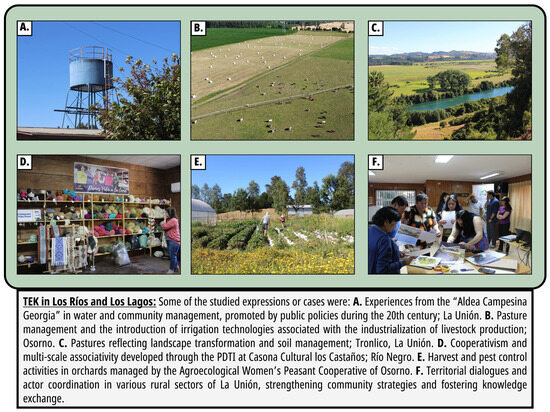
Figure 6.
TEK in Los Ríos and Los Lagos.
One of the pillars of rural development in these regions has been cooperativism, whose origin dates to the impetus of German colonists and state policies that encouraged agricultural associativity. Significant cases include international cooperation initiatives such as the peasant villages built in the mid-20th century. For example, the Georgia peasant village in La Unión remains a paradigmatic case of autonomy and water governance (Figure 6A). Although strained by development, generational turnover, and the orientation toward water privatization in Chile, they have maintained an essential part of the collective dynamics required to sustain solid community relations.
Traditional cooperatives of national relevance, like COLUN, have played a crucial role in strengthening activities such as livestock farming and the dairy industry in the area, integrating TEK elements in their origins (Figure 6B). However, with economic growth and development, technologization and the progressive loss of traditional trades and techniques—such as artisanal dairy production and the elaboration of typical beverages like apple chicha—have ensued. In contrast, other emerging cooperatives, like the Agroecological Women’s Peasant Cooperative of Osorno (AgroeCoop), led by women, have demonstrated how associativity can empower small-scale producers, promoting agroecological techniques that fuse traditional knowledge with contemporary innovations (Figure 6E). This model not only strengthens family peasant agriculture but also generates support and advisory networks contributing to sustainability and food sovereignty.
Comparisons with other contexts stand out. Experiences of cooperativism in France and Ethiopia have demonstrated the potential of community organizations to improve technical efficiency and the sustainability of small agricultural operations [165,166]. In Pakistan [39], integrating TEK into resource management has shown positive results in climate change adaptation, providing valuable lessons that could be replicated in these territories.
At the cultural infrastructure level, the Casona Cultural Los Castaños in Río Negro has been key to revitalizing local economies and generating new job opportunities for Mapuche women (Figure 6D). In this space, the Indigenous Territory Development Program (PDTI) has fostered the integration of technologies and the creation of cooperatives that articulate ancestral and contemporary knowledge around local production (honey, blue eggs, and wool). These initiatives allow women to break with traditional dynamics that relegated them to the domestic sphere, promoting their empowerment and active participation in the public sphere as agents of change [167].
In the textile field, the Corazón de Vellón cooperative in Los Lagos demonstrates an exemplary initiative to keep artisanal wool production alive. This organization brings together artisans and their families, promoting community activities such as “wool washing,” which not only preserve traditional techniques but also reinforce social bonds. These practices reflect another example of TEK’s role and its expressions in constructing resilient community networks and adapting to a changing socio-economic context (Figure 6F).
However, the region also faces significant challenges. The expansion of monocultures, such as forest plantations or hazelnut production, generates tensions in water resource management and biodiversity conservation. Additionally, land burning, historically used for territorial development and community establishment in past centuries, continues to be widespread, exacerbating soil degradation and contributing to landscape transformation (Figure 6C). These practices underscore the urgent need to incorporate agroecological approaches and strengthen environmental education to ensure long-term sustainability.
5.5. Core Insights and Synthesis
The findings of this study underscore the diverse manifestations and adaptive capacities of Traditional Ecological Knowledge (TEK) across Chile’s distinct geographic and climatic regions. Each region showcases specific TEK practices (Figure 7) that address localized environmental, social, and economic challenges while contributing meaningfully to broader sustainable development goals.
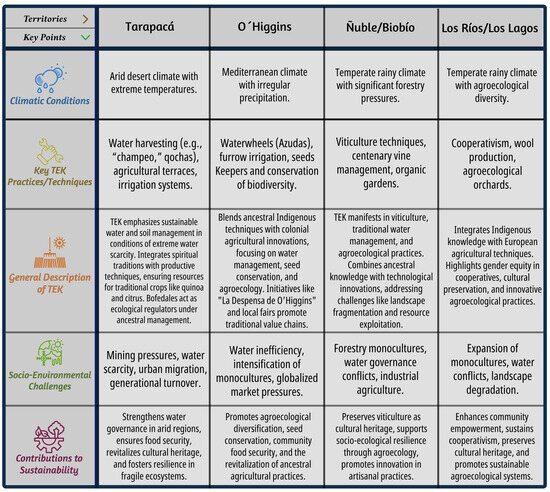
Figure 7.
Cases synthesis.
The following points encapsulate the principal insights, illustrating the interplay between traditional practices, contemporary challenges, and pathways to resilience.
- Diversity of Practices: Across regions, TEK reflects a harmonious integration of ancestral and modern knowledge systems. This is evident in the adaptation of water management techniques in Tarapacá, agroecological innovations in O’Higgins, viticulture resilience in Ñuble and Biobío, and cooperative models in Los Ríos and Los Lagos.
- Socio-Environmental Contributions: TEK supports ecological regulation, biodiversity conservation, food security, and cultural preservation, proving its value as a tool for addressing climate change and socio-economic transformations.
- Challenges to TEK: The findings also reveal shared threats, including land-use pressures, generational knowledge loss, and insufficient integration into contemporary governance frameworks.
- Sustainability Pathways: Collaborative initiatives, such as seed conservation networks, community cooperatives, and agroecological practices, illustrate how TEK can foster resilience, environmental justice, and sustainable transitions when supported by appropriate institutional frameworks and community participation.
6. Discussion
The findings presented in this study outline a complex and heterogeneous panorama of traditional ecological knowledge (TEK) in Chile, evidencing both its adaptive relevance to global climate change and the tensions and challenges that communities face as they attempt to sustain and project these practices within dynamic socio-environmental scenarios. In a context marked by climatic impacts, water crises, productive transformations, and migrations of varying scope, this exploratory, multi-sited research carried out in various regions of the country has made it possible to characterize, contextualize, and compare TEK expressions, identifying common patterns, specificities, and potentialities for their consolidation as a strategic pillar in the transition toward sustainable adaptation.
A key initial point is that TEK, far from representing a static repository, is confirmed as a set of dynamic knowledge, subject to processes of adaptation, hybridization, and reconfiguration. In arid territories of the north, such as Tarapacá, ancestral hydro-productive practices (like champeo, qochas, or the use of agricultural terraces) demonstrate local communities’ capacity to manage their resources under scarcity, anticipate climatic variability, and preserve spiritual traditions associated with the landscape. These practices parallel water sowing and harvesting systems in Ibero-America [168], such as the amunas of Peru and albarradas of Ecuador, which have been instrumental in ensuring water availability for agriculture while maintaining ecosystem health. Both examples highlight how TEK contributes to water governance in fragile and arid ecosystems, offering replicable models for other regions facing water scarcity.
Similarly, in the central part of the country (O’Higgins, Ñuble, Biobío), there are instances of traditional knowledge linked to water management, agricultural production, viticulture, and agroecology. These practices are constantly reconfigured as they interact with contemporary productive pressures—such as agrarian intensification, forest monocultures, and the globalized demands of markets—generating local arrangements that combine ancestral knowledge with technical innovations. This dynamic is echoed in agroforestry practices in northern Ghana [169], where small-scale farmers integrate TEK with soil fertility management to enhance productivity and resilience under changing climatic conditions. Such parallels reinforce the universality of TEK in sustaining agricultural systems while addressing global climate challenges.
In the south, TEK is expressed in the memory of traditional trades, associativity, agroecology, and cooperativism, integrating Indigenous worldviews and technical legacies from European colonization processes. This syncretism is evident in cooperative initiatives that combine innovation, gender equity in traditional spaces, and the strengthening of family peasant agriculture. These efforts align with revitalization initiatives in Alpine Europe [170], where TEK has been successfully integrated into biodiversity conservation and sustainable land use practices, demonstrating the value of co-management frameworks in enhancing socio-ecological resilience.
From a comparative perspective, Chilean dynamics show parallels with experiences in other countries where the co-production of knowledge and inter-epistemic dialogue have proven effective in addressing water crises, food security, and climate uncertainty. For example, in the Indian Himalayas, communities employ TEK to monitor snowmelt and glacial cycles, guiding irrigation and agricultural practices in high-altitude environments. These practices resonate with the Andean TEK in Chile’s high-altitude ecosystems, where community-based hydrological knowledge supports adaptive water governance. Similarly, ethnomedical systems in Bolivia and Ecuador emphasize the intersection of biodiversity conservation and community well-being [171], aligning with Mapuche approaches in Chile that integrate cultural heritage and ecological management.
The relational approach adopted—centered on the interdependencies among communities, ecosystems, technologies, productive practices, and regulations—provides a more comprehensive vision of TEK. It transcends the simple transfer of information, focusing on processes of co-creation of knowledge and territorial governance. This approach is particularly relevant in a context where adaptation to contemporary challenges cannot depend solely on conventional science but must incorporate local understandings of hydrological cycles, biodiversity, and seasonal rhythms. For example, the integration of TEK into governance frameworks in Vanuatu demonstrates how local ecological knowledge can inform disaster risk reduction and resilience-building strategies [172], a principle that has significant potential for replication in Chile and other regions facing climate vulnerabilities [173].
However, structural tensions and power asymmetries among actors highlight limitations and challenges. In this regard, the intensification of forest monocultures, the expansion of agro-industries, and water privatization weaken the socio-ecological base on which TEK depends, generating territorial conflicts and uncertainties about future resource availability. Other factors, such as internal and international migration dynamics, the aging of those who preserve traditional knowledge, the departure of young people to urban centers, and administrative fragmentation among regions, hinder the intergenerational continuity of practices. Moreover, certain traditional methods prove ill-suited to new climatic conditions, requiring their re-evaluation and possible modification without losing their cultural essence.
Addressing this research through an exploratory, multi-sited, and predominantly qualitative methodological strategy has made it possible to capture nuances and complexities impossible to approach solely through quantitative indicators. Participant observations, semi-structured interviews, and interaction with local actors across several territories have revealed how TEK in Chile is not limited to a productive dimension but integrates cultural, spiritual, and affective values, shaping lived territories where daily practices build socio-ecological adaptation. In the future, it will be valuable to advance toward mixed methodological approaches, integrating quantitative analyses, evaluating the long-term impact of TEK incorporation into public policies and climate adaptations, as well as the effectiveness of knowledge co-production in collaborative governance processes.
In this line, there is a need to design policy instruments and institutional spaces that recognize territorial specificities and the legitimacy of TEK, ensuring its articulation with contemporary scientific knowledge. The Chilean experience shows that forming and strengthening knowledge alliances can increase community resilience and environmental justice if appropriate normative frameworks, stable financing, and institutional capacity are consolidated to ensure community participation. Similarly, linking with academia, the public sector, and civil society can foster integrated monitoring and evaluation systems, generating constant feedback and guiding decision-making in changing scenarios.
Each territory presents singularities that are difficult to replicate without contextual adjustments. Likewise, the lack of quantitative indicators hinders the exact measurement of TEK’s impact on adaptation. Nevertheless, the qualitative richness and the rigor in data triangulation establish solid conceptual and empirical foundations for future studies. A promising direction is to delve deeper into the role of TEK in polycentric water governance, productive diversification, and the restoration of degraded landscapes, as well as to seek strategies to revitalize ancestral knowledge among younger generations.
In summary, this study shows that TEK, understood from a relational and integrative approach, constitutes a strategic factor for confronting Chile’s socio-climatic crisis. Far from being a vestige of the past, TEK emerges as dynamic knowledge, capable of hybridizing with science, technology, and public policies, providing culturally pertinent and ecologically viable adaptive pathways. The experiences gathered in different territories and other regions worldwide reveal that it is not only about rescuing ancestral knowledge but about understanding it as part of a socio-ecological continuum, where alliances and co-production of knowledge enable paths toward resilience, environmental justice, and the transition to sustainability.
7. Conclusions
This study deepens the understanding of traditional ecological knowledge (TEK) in Chile, positioning it as a dynamic and strategic system that broadens comparative perspectives with other contexts. By interpreting TEK through a relational lens, this research highlights its value as a resource for addressing complex socio-environmental transformations and fostering adaptive strategies across diverse scenarios. Strengthening its integration into institutional frameworks, public policies, and collaborative research projects represents a decisive step toward fostering more just, resilient, and sustainable societies. This aligns with the goals of the scientific community and the urgent demands of a humanity facing rapid global changes, such as those highlighted in the Sustainable Development Goals (SDGs).
The findings highlight those ancestral practices in water management, agroecology, cooperativism, and traditional viticulture, among others, that not only enhance socio-ecological resilience but also promote intercultural dialogue, social cohesion, and sustainability across multiple scales. These TEK expressions provide a robust foundation for co-creating climate change adaptation strategies, employing participatory methodologies, applying inter- and transdisciplinary approaches, and consolidating knowledge alliances that respect and integrate epistemic and cultural diversity. By fostering such alliances, TEK becomes a key driver in the transition to sustainable development pathways, contributing to equitable resource management and biodiversity conservation.
Looking ahead, there is a pressing need to advance mixed methodological approaches that quantitatively evaluate TEK’s impact in global change scenarios, thus reinforcing its legitimacy and applicability among decision-makers. Comparative research and longitudinal studies will play a pivotal role in identifying the key factors that enable TEK’s adaptability across diverse socio-cultural and ecological contexts, enhancing its scalability and its incorporation as a mainstream environmental policy tool. These efforts will require the promotion of collaborative spaces among communities, academia, and policy-makers, encouraging active participation and knowledge exchange to address the interconnected challenges of the 21st century. By doing so, TEK can contribute significantly to achieving sustainability goals, fostering resilience, and guiding transformative actions in an era of unprecedented global change.
Author Contributions
Conceptualization, P.S.-Á., J.R.H., and R.O.B.; methodology, P.S.-Á.; validation, P.S.-Á., J.R.H., and R.O.B.; formal analysis, P.S.-Á.; investigation, P.S.-Á.; resources, P.S.-Á.; data curation, P.S.-Á.; writing—original draft preparation, P.S.-Á.; writing—review and editing, P.S.-Á. and J.R.H.; visualization, R.O.B.; supervision, J.R.H. and R.O.B.; project administration, P.S.-Á. and J.R.H.; funding acquisition, J.R.H. and R.O.B. All authors have read and agreed to the published version of the manuscript.
Funding
This research was funded by the National Doctoral Scholarship, grant number 21211340, provided by the National Agency for Research and Development. Also, this research received support of the Water Resources Center for Agriculture and Mining (CRHIAM) ANID/FONDAP/15130015-ANID/FONDAP/1523A0001.
Institutional Review Board Statement
The study was carried out in accordance with the Declaration of Helsinki and under the regulations approved by the Ethics, Bioethics and Biosafety Committee of the University of Concepción in decree No. 2017-083 of 19 June 2017.
Informed Consent Statement
Informed consent was obtained from all subjects involved in this study.
Data Availability Statement
The data that support the results of this study are available on request from the corresponding author, P.S. The data are not publicly available due to ethical considerations and to protect the privacy of those who participated.
Acknowledgments
Special thanks to communities, organizations, and institutions that collaborated in the development of this research.
Conflicts of Interest
The authors declare no conflicts of interest.
References
- Meyer, R. Uncertainty as a science policy problem. Clim. Change 2012, 110, 1–2. [Google Scholar] [CrossRef]
- Workman, M.; Dooley, K.; Lomax, G.; Maltby, J.; Darch, G. Decision making in contexts of deep uncertainty—An alternative approach for long-term climate policy. Environ. Sci. Policy 2019, 103, 77–84. [Google Scholar] [CrossRef]
- Nakashima, D.J.; McLean, K.G.; Thulstrup, H.D.; Castillo, A.R.; Rubis, J.T. Weathering Uncertainty: Traditional Knowledge for Climate Change Assessment and Adaptation; UNESCO: Paris, France, 2012. [Google Scholar]
- IPCC. Global Warming of 1.5 °C. Summary for Policymakers; Reporte Especial del Panel Intergubernamental del Cambio Climático; IPCC: Geneva, Switzerland, 2018. [Google Scholar]
- Kassam, K. Transdisciplinary research, Indigenous knowledge, and wicked problems. Rangelands 2021, 43, 133–141. [Google Scholar] [CrossRef]
- Raymond, C.M.; Fazey, I.; Reed, M.S.; Stringer, L.C.; Robinson, G.M.; Evely, A.C. Integrating local and scientific knowledge for environmental management. J. Environ. Manag. 2010, 91, 1766–1777. [Google Scholar] [CrossRef] [PubMed]
- Alexander, C.; Bynum, N.; Johnson, E.; King, U.; Mustonen, T.; Neofotis, P.; Oettlé, N.; Rosenzweig, C.; Sakakibara, C.; Shadrin, V.; et al. Linking Indigenous and Scientific Knowledge of Climate Change. BioScience 2011, 61, 477–484. [Google Scholar] [CrossRef]
- Berkes, F. Sacred Ecology, 3rd ed.; Routledge: New York, NY, USA, 2012. [Google Scholar]
- Berkes, F.; Colding, J.; Folke, C. Rediscovery of Traditional Ecological Knowledge as Adaptive Management. Ecol. Appl. 2000, 10, 1251–1262. [Google Scholar] [CrossRef]
- Gómez-Baggethun, E.; Reyes-García, V. Reinterpreting change in traditional ecological knowledge. Hum. Ecol. 2013, 41, 643–647. [Google Scholar] [CrossRef]
- Gwandure, C.; Lukhele-Olorunju, P. Women’s use of indigenous knowledge in Africa. Soc. Sci. Humanit. Open 2023, 8, 100741. [Google Scholar] [CrossRef]
- Hosen, N.; Nakamura, H.; Hamzah, A. Adaptation to Climate Change: Does Traditional Ecological Knowledge Hold the Key? Sustainability 2020, 12, 676. [Google Scholar] [CrossRef]
- Lemi, T. The role of traditional ecological knowledge (TEK) for climate change adaptation. Int. J. Environ. Sci. Nat. Resour. 2019, 18, 28–31. [Google Scholar] [CrossRef]
- Olazabal, M.; Chu, E.; Broto, V.C.; Patterson, J. Subaltern forms of knowledge are required to boost local adaptation. One Earth 2021, 4, 828–838. [Google Scholar] [CrossRef]
- Wibeck, V.; Eliasson, K.; Neset, T. Co-creation research for transformative times: Facilitating foresight capacity in view of global sustainability challenges. Environ. Sci. Policy 2021, 128, 290–298. [Google Scholar] [CrossRef]
- Kumar, V. Role of Indigenous Knowledge in Climate Change Adaptation Strategies: A Study with Special Reference to North-Western India. J. Geogr. Nat. Disasters 2015, 5. [Google Scholar] [CrossRef]
- Novalia, W.; Malekpour, S. Theorising the role of crisis for transformative adaptation. Environ. Sci. Policy 2020, 112, 361–370. [Google Scholar] [CrossRef]
- Šūmane, S.; Kunda, I.; Knickel, K.; Strauss, A.; Tisenkopfs, T.; Rios, I.D.I.; Rivera, M.; Chebach, T.; Ashkenazy, A. Local and farmers’ knowledge matters! How integrating informal and formal knowledge enhances sustainable and resilient agriculture. J. Rural Stud. 2017, 59, 232–241. [Google Scholar] [CrossRef]
- Altieri, M.A. Agroecología: Principios y estrategias para diseñar sistemas agrícolas sostenibles. Agroecol. Y Desarro. Rural Sustentable 2011, 1, 25–37. [Google Scholar]
- Altieri, M.A.; Toledo, V.M. The agroecological revolution in Latin America: Rescuing nature, ensuring food sovereignty and empowering peasants. J. Peasant Stud. 2011, 38, 587–612. [Google Scholar] [CrossRef]
- Altieri, M.A.; Nicholls, C.I. Agroecology and the reconstruction of a post-COVID-19 agriculture. J. Peasant Stud. 2020, 47, 881–898. [Google Scholar] [CrossRef]
- Ludwig, D.; Poliseli, L. Relating traditional and academic ecological knowledge: Mechanistic and holistic epistemologies across cultures. Biol. Philos. 2018, 33. [Google Scholar] [CrossRef]
- Pohl, C.; Klein, J.T.; Hoffmann, S.; Mitchell, C.; Fam, D. Conceptualising transdisciplinary integration as a multidimensional interactive process. Environ. Sci. Policy 2021, 118, 18–26. [Google Scholar] [CrossRef]
- Arnott, J.C.; Neuenfeldt, R.J.; Lemos, M.C. Co-producing science for sustainability: Can funding change knowledge use? Glob. Environ. Change 2019, 60, 101979. [Google Scholar] [CrossRef]
- Foggin, J.M.; Brombal, D.; Razmkhah, A. Thinking Like a Mountain: Exploring the Potential of Relational Approaches for Transformative Nature Conservation. Sustainability 2021, 13, 12884. [Google Scholar] [CrossRef]
- Whyte, K.P. On the role of traditional ecological knowledge as a collaborative concept: A philosophical study. Ecol. Process. 2013, 2, 7. [Google Scholar] [CrossRef]
- Reyes-García, V.; Guèze, M.; Luz, A.C.; Paneque-Gálvez, J.; Macía, M.J.; Orta-Martínez, M.; Pino, J.; Rubio-Campillo, X. Evidence of traditional knowledge loss among a contemporary indigenous society. Evol. Hum. Behav. 2013, 34, 249–257. [Google Scholar] [CrossRef]
- Albuquerque, U.; Cantalice, A.; Oliveira, D.; Oliveira, E.S.; Santos, E.B.d.; Santos, F.I.R.d.; Soldati, G.T.; Lima, I.d.S.; Silva, J.V.M.; Abreu, M.B.; et al. ¿Por qué se mantiene el conocimiento ecológico tradicional (CTE)? Una respuesta a Hartel et al. Biodivers. Conserv. 2024, 33, 859–866. [Google Scholar] [CrossRef]
- Hill, R.; Adem, Ç.; Alangui, W.V.; Molnár, Z.; Aumeeruddy-Thomas, Y.; Bridgewater, P.; Tengo, M.; Thaman, R.; Yao, C.Y.A.; Berkes, F.; et al. Working with indigenous, local and scientific knowledge in assessments of nature and nature’s linkages with people. Curr. Opin. Environ. Sustain. 2020, 43, 8–20. [Google Scholar]
- Singh, R.K.; Singh, A.; Sheoran, P.; Sharma, D.K.; Sharma, P.C. ‘Mera Gaon, Mera Gaurav’ policy: A source of hypothesis for the co-production of adaptive agricultural knowledge. Indian J. Agric. Sci. 2019, 89, 1410–1414. [Google Scholar] [CrossRef]
- Biró, M.; Molnár, Z.; Babai, D.; Dénes, A.; Fehér, A.; Barta, S.; Sáfián, L.; Szabados, K.; Kiš, A.; Demeter, L.; et al. Reviewing historical traditional knowledge for innovative conservation management: A re-evaluation of wetland grazing. Sci. Total Environ. 2019, 666, 1114–1125. [Google Scholar] [CrossRef]
- Berkes, F.; Berkes, M.K. Ecological complexity, fuzzy logic, and holism in indigenous knowledge. Futures 2009, 41, 6–12. [Google Scholar] [CrossRef]
- Acosta, A.; Vivir, E.B. Sumak Kawsay, Una Oportunidad Para Imaginar Otros Mundos; Editorial Icaria: Barcelona, Spain, 2013. [Google Scholar]
- Abasolo, V. Revalorización de los saberes tradicionales campesinos relacionados con el manejo de tierras agrícolas. Rev. De Cienc. Soc. De La Univ. Iberoam. 2011, 6, 98–120. [Google Scholar]
- Rai, S.; Mishra, P. Conocimiento ecológico tradicional y gestión de recursos: Un marco conceptual. In Conocimiento Ecológico Tradicional de la Gestión de Recursos en Asia; Rai, S.C., Mishra, P.K., Eds.; Springer: Cham, Switzerland, 2022. [Google Scholar] [CrossRef]
- Malapane, O.L.; Chanza, N.; Musakwa, W. Transmission of indigenous knowledge systems under changing landscapes within the vhavenda community, South Africa. Environ. Sci. Policy 2024, 161, 103861. [Google Scholar] [CrossRef]
- Cacho, M.M.Y.T.G.; Giraldo, O.F.; Aldasoro, M.; Morales, H.; Ferguson, B.G.; Rosset, P.; Khadse, A.; Campos, C. Bringing agroecology to scale: Key drivers and emblematic cases. Agroecol. Sustain. Food Syst. 2018, 42, 637–665. [Google Scholar] [CrossRef]
- Zhang, X.; Khachatryan, H.; Knuth, M. Relating Knowledge and Perception of Sustainable Landscape Practices to the Adoption Intention of Environmentally Friendly Landscapes. Sustainability 2021, 13, 14070. [Google Scholar] [CrossRef]
- Jamil, A.; Zubair, M.; Manzoor, S.A. A Herder’s eye view: Traditional ecological knowledge based indicators for monitoring rangeland conditions in Thal, Pakistan. Environ. Dev. 2022, 42, 100699. [Google Scholar] [CrossRef]
- Audefroy, J.F.; Sánchez, B.N.C. Integrating local Knowledge for Climate Change Adaptation in Yucatán, Mexico. Int. J. Sustain. Built Environ. 2017, 6, 228–237. [Google Scholar] [CrossRef]
- Gudynas, E. Extractivismos y corrupción en América del Sur. Estructuras, dinámicas y tendencias en una íntima relación. RevIISE 2017, 10, 73–87. [Google Scholar]
- Williams, P.A.; Sikutshwa, L.; Shackleton, S. Acknowledging Indigenous and Local Knowledge to Facilitate Collaboration in Landscape Approaches—Lessons from a Systematic Review. Land 2020, 9, 331. [Google Scholar] [CrossRef]
- Nadasdy, P. The Politics of Tek: Power and the “Integration” of Knowledge. Arct. Anthropol. 1999, 36, 1–18. Available online: http://www.jstor.org/stable/40316502 (accessed on 7 October 2024).
- Huntington, H. Using Traditional Ecological Knowledge in Science: Methods and Applications. Ecol. Appl. 2000, 10, 1270–1274. [Google Scholar]
- Mistry, J.; Berardi, A. Bridging indigenous and scientific knowledge. Science 2016, 352, 1274–1275. [Google Scholar] [CrossRef]
- McCarter, J.; Gavin, M.C.; Baereleo, S.; Love, M. The challenges of maintaining indigenous ecological knowledge. Ecol. Soc. 2014, 19, 39. [Google Scholar] [CrossRef]
- Hackfort, S.; Burchardt, H. Analyzing socio-ecological transformations—A relational approach to gender and climate adaptation. Crit. Policy Stud. 2016, 12, 169–186. [Google Scholar] [CrossRef]
- Klenk, N.; Meehan, K. Climate change and transdisciplinary science: Problematizing the integration imperative. Environ. Sci. Policy 2015, 54, 160–167. [Google Scholar] [CrossRef]
- Pormon, M.M.M.; Lejano, R.P. Relational epistemologies for sustainability and resilience towards disasters. Prog. Disaster Sci. 2022, 17, 100272. [Google Scholar] [CrossRef]
- West, S.; Haider, L.J.; Stålhammar, S.; Woroniecki, S. A relational turn for sustainability science? Relational thinking, leverage points and transformations. Ecosyst. People 2020, 16, 304–325. [Google Scholar] [CrossRef]
- O’Brien, K.; Carmona, R.; Gram-Hanssen, I.; Hochachka, G.; Sygna, L.; Rosenberg, M. Fractal approaches to scaling transformations to sustainability. AMBIO 2023, 52, 1448–1461. [Google Scholar] [CrossRef]
- Shein, P.P.; Sukinarhimi, P. Taboos as a Social Mechanism Keeping the Human-Nature Balance: Core Values and Practices of Rukai Traditional Ecological Knowledge of Water. Sustainability 2022, 14, 2032. [Google Scholar] [CrossRef]
- Menatti, L.; Bich, L.; Saborido, C. Health and environment from adaptation to adaptivity: A situated relational account. Hist. Philos. Life Sci. 2022, 44, 38. [Google Scholar] [CrossRef]
- Siders, A. Adaptive capacity to climate change: A synthesis of concepts, methods, and findings in a fragmented field. Wiley Interdiscip. Rev. Clim. Change 2019, 10, e573. [Google Scholar] [CrossRef]
- Pelling, M. Adaptation to Climate Change: From Resilience to Transformation; Routledge: London, UK, 2011. [Google Scholar]
- Armitage, D.; Berkes, F.; Doubleday, N. (Eds.) Adaptive Co-Management: Collaboration, Learning, and Multi-Level Governance; UBC Press: Vancouver, BC, Canada, 2007. [Google Scholar]
- Djenontin, I.N.S.; Meadow, A.M. The art of co-production of knowledge in environmental sciences and management: Lessons from international practice. Environ. Manag. 2018, 61, 885–903. [Google Scholar] [CrossRef]
- Boiral, O.; Heras-Saizarbitoria, I.; Brotherton, M. Improving environmental management through indigenous peoples’ involvement. Environ. Sci. Policy 2019, 103, 10–20. [Google Scholar] [CrossRef]
- Bouzarovski, S. Just Transitions: A Political Ecology critique. Antipode 2022, 54, 1003–1020. [Google Scholar] [CrossRef]
- DeLonge, M.S.; Miles, A.; Carlisle, L. Investing in the transition to sustainable agriculture. Environ. Sci. Policy 2016, 55, 266–273. [Google Scholar] [CrossRef]
- Akinnagbe, O.M.; Iroh, I.J. Agricultural adaptation strategies to climate change impacts in Africa: A review. Bangladesh J. Agric. Res. 2014, 39, 407–418. [Google Scholar]
- Harisha, R.P. Traditional Ecological Knowledge (TEK) and its importance in South India: Perspective from local communities. Appl. Ecol. Environ. Res. 2016, 14, 311–326. [Google Scholar] [CrossRef]
- Saylor, C.R.; Alsharif, K.A.; Torres, H. The importance of traditional ecological knowledge in agroecological systems in Peru. Int. J. Biodivers. Sci. Ecosyst. Serv. Manag. 2017, 13, 150–161. [Google Scholar] [CrossRef]
- Flores, J.C.G.; Cedillo, J.G.G.; Plata, M.Á.B.; Pérez, J.I.J. Análisis del conocimiento ecológico tradicional y factores socioculturales sobre huertos familiares en el Altiplano Central Mexicano. Cuadernos Geogr. 2019, 58, 260–281. [Google Scholar] [CrossRef]
- Keats, B.; Evans, P. Traditional knowledge and resource management in the northwest territories, Canada: Definitions, disciplinary divides, and reasons for decisions. Extr. Ind. Soc. 2020, 7, 1309–1318. [Google Scholar] [CrossRef]
- Moser, S.C. Can science on transformation transform science? Lessons from co-design. Curr. Opin. Environ. Sustain. 2016, 20, 106–115. [Google Scholar] [CrossRef]
- Gram-Hanssen, I.; Schafenacker, N.; Bentz, J. Decolonizing transformations through ‘right relations’. Sustain. Sci. 2021, 17, 673–685. [Google Scholar] [CrossRef]
- Leonardsson, H.; Kronsell, A.; Andersson, E.; Burman, A.; Blanes, R.; Da Costa, K.; Hasselskog, M.; Stepanova, O.; Öjendal, J. Achieving peaceful climate change adaptation through transformative governance. World Dev. 2021, 147, 105656. [Google Scholar] [CrossRef]
- Puri, N. Integrating Scientific with Indigenous Knowledge: Constructing Knowledge Alliances for Land Management in India. MIS Q. 2007, 31, 355. [Google Scholar] [CrossRef]
- Aswani, S.; Lemahieu, A.; Sauer, W.H.H. Global trends of local ecological knowledge and future implications. PLoS ONE 2018, 13, e0195440. [Google Scholar] [CrossRef]
- Kuhlicke, C.; De Brito, M.M.; Bartkowski, B.; Botzen, W.; Doğulu, C.; Han, S.; Hudson, P.; Karanci, A.N.; Klassert, C.J.; Otto, D.; et al. Spinning in circles? A systematic review on the role of theory in social vulnerability, resilience and adaptation research. Glob. Environ. Change 2023, 80, 102672. [Google Scholar] [CrossRef]
- Mauser, W.; Klepper, G.; Rice, M.; Schmalzbauer, B.S.; Hackmann, H.; Leemans, R.; Moore, H. Transdisciplinary global change research: The co-creation of knowledge for sustainability. Curr. Opin. Environ. Sustain. 2013, 5, 420–431. [Google Scholar] [CrossRef]
- Berke, P.R.; Quiring, S.M.; Olivera, F.; Horney, J.A. Addressing Challenges to Building Resilience Through Interdisciplinary Research and Engagement. Risk Anal. 2018, 41, 1248–1253. [Google Scholar] [CrossRef]
- Smetschka, B.; Gaube, V. Co-creating formalized models: Participatory modelling as method and process in transdisciplinary research and its impact potentials. Environ. Sci. Policy 2019, 103, 41–49. [Google Scholar] [CrossRef]
- Birchall, S.J.; MacDonald, S.; Slater, T. Anticipatory planning: Finding balance in climate change adaptation governance. Urban Clim. 2021, 37, 100859. [Google Scholar] [CrossRef]
- Bollier, D. Pensar Desde Los Comunes; Sursiendo, de Sueños, T., Limón, T., Eds.; Cornucopia y Guerrilla Translation: Amherst, MA, USA, 2016; ISBN 978-84-945978-1-7. [Google Scholar]
- Boon, W.P.C.; Hessels, L.K.; Horlings, E. Knowledge co-production in protective spaces: Case studies of two climate adaptation projects. Reg. Environ. Change 2019, 19, 1935–1947. [Google Scholar] [CrossRef]
- Turnhout, E.; Metze, T.; Wyborn, C.; Klenk, N.; Louder, E. The politics of co-production: Participation, power, and transformation. Curr. Opin. Environ. Sustain. 2019, 42, 15–21. [Google Scholar] [CrossRef]
- Posner, E.; Weisbach, D. Climate Change Justice; Princeton University Press: Princeton, NJ, USA, 2010. [Google Scholar]
- Darbellay, F. Rethinking inter- and transdisciplinarity: Undisciplined knowledge and the emergence of a new thought style. Futures 2014, 65, 163–174. [Google Scholar] [CrossRef]
- Arnott, J.C.; Mach, K.J.; Wong-Parodi, G. Editorial overview: The science of actionable knowledge. Curr. Opin. Environ. Sustain. 2020, 42, A1–A5. [Google Scholar] [CrossRef]
- Grandia, L. Slow ethnography: A hut with a view. Crit. Anthropol. 2015, 35, 301–317. [Google Scholar] [CrossRef]
- Morin, E. La Mente Bien Ordenada. Repensar la Reforma. Reformar el Pensamiento; Seix Barral: Barcelona, Spain, 2001. [Google Scholar]
- Stock, P.V.; Forney, J. Farmer autonomy and the farming self. J. Rural Stud. 2014, 36, 160–171. [Google Scholar] [CrossRef]
- Ludwig, D.; Macnaghten, P. Traditional ecological knowledge in innovation governance: A framework for responsible and just innovation. J. Responsible Innov. 2019, 7, 26–44. [Google Scholar] [CrossRef]
- Fernández-Llamazares, Á.; Díaz-Reviriego, I.; Luz, A.C.; Cabeza, M.; Pyhälä, A.; Reyes-García, V. Rapid ecosystem change challenges the adaptive capacity of Local Environmental Knowledge. Glob. Environ. Change 2015, 31, 272–284. [Google Scholar] [CrossRef]
- Jimenez, A.; Delgado, D.; Merino, R.; Argumedo, A. A Decolonial Approach to Innovation? Building Paths Towards Buen Vivir. J. Dev. Stud. 2022, 58, 1633–1650. [Google Scholar] [CrossRef]
- Sarricolea, P.; Herrera-Ossandon, M.; Meseguer-Ruiz, Ó. Climatic regionalisation of continental Chile. J. Maps 2016, 13, 66–73. [Google Scholar] [CrossRef]
- Guerrero-Gatica, M.; Mujica, M.I.; Barceló, M.; Vio-Garay, M.F.; Gelcich, S.; Armesto, J.J. Traditional and Local Knowledge in Chile: Review of Experiences and Insights for Management and Sustainability. Sustainability 2020, 12, 1767. [Google Scholar] [CrossRef]
- Barreau, A.; Ibarra, J.T.; Wyndham, F.S.; Rojas, A.; Kozak, R.A. How Can We Teach Our Children if We Cannot Access the Forest? Generational Change in Mapuche Knowledge of Wild Edible Plants in Andean Temperate Ecosystems of Chile. J. Ethnobiol. 2016, 36, 412–432. [Google Scholar] [CrossRef]
- Cortez, H.G.; Kröll, H.G. La propiedad de la tierra entre los Aymara del altiplano chileno, 1880–2020. Rev. De Geogr. Norte Gd. 2022, 83, 67–86. [Google Scholar] [CrossRef]
- Canales, M.; Hernández, M.C. Del fundo al mundo. Cachapoal, un caso de globalización agropolitana. Espac. Abierto 2011, 20, 579–605. [Google Scholar]
- Larenas, J.; Sahady, A.; Bravo, M.; Quilodrán, C.; Fuster, X. Las ruedas de Larmahue: Una manifestación de construcción de territorio y paisaje agrario. Rev. INVI 2014, 29, 189–216. [Google Scholar] [CrossRef]
- Salazar, P.A. Fiestas costumbristas en la Región del Libertador General Bernardo O’Higgins, Chile: Tradiciones, gastronomía y religiosidad en el centro de la fiesta. Rev. RIVAR 2020, 8, 179–197. [Google Scholar] [CrossRef]
- Sahady, A.; Bravo, J.; Quilodrán, C. Azudas de Larmahue: Al rescate del recurso hídrico en medio de un terreno secano, en pleno valle del Cachapoal, Sexta Región. AUS 2012, 12, 18–21. [Google Scholar] [CrossRef]
- Bravo Sánchez, J.M.; Sahady Villanueva, A.; Quilodrán Rubio, C. Azudas en Chile: Un Vernáculo Sistema de Riego en Tierras de Secano; Papeles de Geografía; Universidad de Murcia: Murcia, Spain, 2013. [Google Scholar]
- Alar, M.L. Vino del Desierto. Una oportunidad para recuperar una tradición de la agricultura del desierto. Idesia 2019, 37, 3–4. [Google Scholar] [CrossRef]
- Rojas, C.D. Modernización y Conflicto Social. La Expropiación de las Aguas de Regadío a los Campesinos del Valle de Quisma (Oasis de Pica) y el Abastecimiento Fiscal a Iquique, 1880–1937. Chungara 2012, 44, 195–196. [Google Scholar] [CrossRef]
- Meza, M.; Pereira, K.; Jofré, J. Saberes y estrategias de adaptación a la disponibilidad hídrica en las yungas secas del norte de Chile. Rev. De Geogr. Norte Gd. 2020, 76, 255–277. [Google Scholar] [CrossRef]
- Meseguer-Ruiz, Ó.; Prieto, M.; Carimán, K.V.G. Conocimiento ecológico tradicional en el Altiplano chileno: Entre la variabilidad climática y la percepción local. Rev. De Geogr. Norte Gd. 2022, 83, 107–123. [Google Scholar] [CrossRef]
- Becerra, P.; Sepúlveda, P. Water crisis in Chile: Hydrological governance and the role of indigenous knowledge. Water Int. 2021, 46, 696–711. [Google Scholar]
- Carrasco-Escaff, T.; Garreaud, R.; Bozkurt, D.; Jacques-Coper, M.; Pauchard, A. The key role of extreme weather and climate change in the occurrence of exceptional fire seasons in south-central Chile. Weather Clim. Extrem. 2024, 45, 100716. [Google Scholar] [CrossRef]
- Peterson, V.A.; Castillo, E.J.; Reyes, L.A. Fires in central-southern Chile’s (sustainable) green suburbs. Resour. Environ. Sustain. 2023, 13, 100123. [Google Scholar] [CrossRef]
- Cortina, M.; Madeira, C. Exposures to climate change’s physical risks in Chile. Lat. Am. J. Cent. Bank. 2023, 4, 100090. [Google Scholar] [CrossRef]
- Centro de Ciencia del Clima y la Resiliencia CR2. El Antropoceno en Chile: Evidencias y Formas de Avanzar. 2019. Available online: http://www.cr2.cl/wp-content/uploads/2019/03/Informe-Antropoceno-castellano-2.pdf (accessed on 28 November 2024).
- Garreaud, R.D.; Boisier, J.P.; Rondanelli, R.; Montecinos, A.; Sepúlveda, H.H.; Veloso-Aguila, D. The Central Chile Mega Drought (2010–2018): A climate dynamics perspective. Int. J. Climatol. 2020, 40, 421–439. [Google Scholar] [CrossRef]
- Boisier, J.P.; Alvarez-Garreton, C.; Cordero, R.R.; Damiani, A.; Gallardo, L.; Garreaud, R.D.; Lambert, F.; Ramallo, C.; Rojas, M.; Rondanelli, R. Anthropogenic drying in central-southern Chile evidenced by long-term observations and climate model simulations. Elem. Sci. Anthr. 2018, 6, 74. [Google Scholar] [CrossRef]
- Cámara-Leret, R.; Bascompte, J. Language extinction triggers the loss of unique medicinal knowledge. Proc. Natl. Acad. Sci. USA 2021, 118, e2103683118. [Google Scholar] [CrossRef]
- Robles, C. The agrarian historiography of Chile: Foundational interpretations, conventional reiterations, and critical revisionism. Historia Agraria Revista de Agricultura e Historia Rural, 1 August 2020; pp. 93–122. [Google Scholar] [CrossRef]
- Panez-Pinto, A.; Faúndez-Vergara, R.; Mansilla-Quiñones, C. Politización de la crisis hídrica en Chile: Análisis del conflicto por el agua en la provincia de Petorca. Agua Y Territ./Water Landsc. 2017, 10, 131. [Google Scholar] [CrossRef]
- Rodrigo, L.M.; Mateo-Peinado, L. Internal migration and economic mobility in Chile. Reg. Stud. 2023, 58, 1377–1389. [Google Scholar] [CrossRef]
- Rueda-Salazar, S.; García, J. The public health challenges of female migration: The Venezuelan diaspora in Andean countries. Int. J. Equity Health 2024, 23, 210. [Google Scholar] [CrossRef]
- Rojas, J.; Silva Ávila, P.; Barra, R.; Figueroa, R.; Arumi, J.L.; Hansen-Rojas, G. Bienes Comunes y Diversidad Biocultural en Tiempos de Crisis: Escasez Hídrica, Pandemia y Cambio Climático; CRHIAM (ANID/FONDAP 15130015), Universidad de Concepción; RIL Editores: Santiago, Chile, 2021; ISBN 978-84-18982-17-0. [Google Scholar]
- Pettenger, M.E. (Ed.) The Social Construction of Climate Change: Power, Knowledge, Norms, Discources; Routledge: London, UK, 2007. [Google Scholar]
- Cologna, V.; Kotcher, J.; Mede, N.G.; Besley, J.; Maibach, E.W.; Oreskes, N. Trust in climate science and climate scientists: A narrative review. PLoS Clim. 2024, 3, e0000400. [Google Scholar] [CrossRef]
- Melo, O.; Báez, N.; Acuña, D. Towards Sustainable Agriculture in Chile, Reflections on the Role of Public Policy. Int. J. Agric. Nat. Resour. 2021, 48, 186–209. [Google Scholar] [CrossRef]
- Ocampo-Melgar, A.; Urquiza, A. Estudio de la Gestión Adaptativa en Chile: Descubriendo Elementos Para la Resiliencia; Universidad de Chile: Santiago, Chile, 2024. [Google Scholar] [CrossRef]
- Uiterkamp, A.J.M.S.; Vlek, C. Practice and Outcomes of Multidisciplinary Research for Environmental Sustainability. J. Soc. Issues 2007, 63, 175–197. [Google Scholar] [CrossRef]
- Parsons, M.; Fisher, K.; Nalau, J. Alternative approaches to co-design: Insights from indigenous/academic research collaborations. Curr. Opin. Environ. Sustain. 2016, 20, 99–105. [Google Scholar] [CrossRef]
- Marcus, G.E. Ethnography in/of the World System: The Emergence of Multi-Sited Ethnography. In Ethnography Through Thick and Thin; Marcus, G.E., Ed.; Princeton University Press: New Jersey, NY, USA, 1995; pp. 79–104. [Google Scholar]
- Hage, G. A not so multi-sited ethnography of a not so imagined community. Anthropol. Theory 2005, 5, 463–475. [Google Scholar]
- Lützhöft, M.; Nyce, J.M.; Petersen, S. Epistemology in ethnography: Assessing the quality of knowledge in human factors research. Theor. Issues Ergon. Sci. 2010, 11, 532–545. [Google Scholar] [CrossRef]
- Shah, A. Ethnography? Hau J. Ethnogr. Theory 2017, 7, 45–59. [Google Scholar] [CrossRef]
- Uldam, J.; McCurdy, P. Studying Social Movements: Challenges and Opportunities for Participant Observation. Sociol. Compass 2013, 7, 941–951. [Google Scholar] [CrossRef]
- Dawson, N.; Coolsaet, B.; Sterling, E.; Loveridge, R.; Gross-Camp, N.; Wongbusarakum, S.; Sangha, K.; Scherl, L.; Phuong Phan, H.; Zafra-Calvo, N.; et al. El papel de los pueblos indígenas y las comunidades locales en la conservación eficaz y equitativa. Ecol. Soc. 2021, 26, 19. [Google Scholar] [CrossRef]
- Dominique, M.; Chavez, D.; Gavin, M. Una evaluación global de la participación de las comunidades indígenas en la investigación climática. Environ. Res. Lett. 2018, 13, 123005. [Google Scholar] [CrossRef]
- Qureshi, H.A.; Ünlü, Z. Beyond the Paradigm Conflicts: A Four-Step Coding Instrument for Grounded Theory. Int. J. Qual. Methods 2020, 19, 1–10. [Google Scholar] [CrossRef]
- Keahey, J. Sustainable Development and Participatory Action Research: A Systematic Review. Syst. Pract. Action Res. 2021, 34, 291–306. [Google Scholar] [CrossRef]
- Verwoerd, L.; Klaassen, P.; Van Veen, S.; De Wildt-Liesveld, R.; Regeer, B. Combining the roles of evaluator and facilitator: Assessing societal impacts of transdisciplinary research while building capacities to improve its quality. Environ. Sci. Policy 2019, 103, 32–40. [Google Scholar] [CrossRef]
- García-Nieto, A.P.; Quintas-Soriano, C.; García-Llorente, M.; Palomo, I.; Montes, C.; Martín-López, B. Collaborative mapping of ecosystem services: The role of stakeholders’ profiles. Ecosyst. Serv. 2015, 13, 141–152. [Google Scholar] [CrossRef]
- Jerolmack, C.; Khan, S. Talk Is Cheap: Ethnography and the Attitudinal Fallacy. Sociol. Methods Res. 2014, 43, 178–209. [Google Scholar]
- Rodela, R. The social learning discourse: Trends, themes and interdisciplinary influences in current research. Environ. Sci. Policy 2012, 25, 157–166. [Google Scholar] [CrossRef]
- Scoones, I.; Stirling, A.; Abrol, D.; Atela, J.; Charli-Joseph, L.; Eakin, H.; Ely, A.; Olsson, P.; Pereira, L.; Priya, R.; et al. Transformations to sustainability: Combining structural, systemic and enabling approaches. Curr. Opin. Environ. Sustain. 2020, 42, 65–75. [Google Scholar] [CrossRef]
- Davis, A.; Ruddle, K. Construyendo confianza: Escepticismo racional e investigación sistemática en la investigación del conocimiento ecológico local. Ecol. Appl. 2010, 20, 880–894. [Google Scholar] [CrossRef]
- King, N.; Horrocks, C. Interviews in Qualitative Research; Sage: London, UK, 2010. [Google Scholar]
- Kvale, S.; Brinkmann, S. Interviews: Learning the Craft of Qualitative Research Interviewing; Sage: London, UK, 2009. [Google Scholar]
- Cardoso, A.R.; Fernandes, C.; Honrado, J.P. Social-ecological memory: From concepts and methods to applications. Geogr. Res. 2024, 1–20, Early View. [Google Scholar] [CrossRef]
- Glaser, B.; Strauss, A. The Discovery of Grounded Theory; Aldine Publishing Company: Hawthorne, NY, USA, 1967. [Google Scholar]
- Olson, J.; McAllister, C.; Grinnell, L.; Walters, K.G.; Appunn, F. Applying Constant Comparative Method with Multiple Investigators and Inter-Coder Reliability. Qual. Rep. 2016. [Google Scholar] [CrossRef]
- Deterding, N.M.; Waters, M.C. Flexible Coding of In-depth Interviews: A Twenty-first-century Approach. Sociol. Methods Res. 2018, 50, 708–739. [Google Scholar] [CrossRef]
- Chatfield, S.L. Recommendations for Secondary Analysis of Qualitative Data. Qual. Rep. 2020, 25, 833–842. [Google Scholar] [CrossRef]
- Perez-Sindin Lopez, X. Secondary Data: Advantages and disadvantages. In The SAGE Encyclopedia of Communication Research Methods; Allen, M., Ed.; SAGE: Thousand Oaks, CA, USA, 2017; pp. 1578–1579. [Google Scholar]
- Strauss, A.; Corbin, J. Basics of Qualitative Research: Grounded Theory Procedures and Techniques; Sage: Newbury Park, CA, USA, 2008. [Google Scholar]
- Qureshi, H.A. Rethinking sampling in grounded theory: Reflections for novice grounded theorists. Int. J. Contemp. Res. Rev. 2018, 9, 20187–20194. [Google Scholar] [CrossRef]
- Allen, N.; Davey, M. The Value of Constructivist Grounded Theory for Built Environment Researchers. J. Plan. Educ. Res. 2017, 38, 222–232. [Google Scholar] [CrossRef]
- Walker, D.; Myrick, F. Grounded theory: An exploration of process and procedure. Qual. Health Res. 2006, 16, 547–559. [Google Scholar] [CrossRef]
- Timmermans, S.; Tavory, I. Theory Construction in Qualitative Research: From Grounded Theory to Abductive Analysis. Sociol. Theory 2012, 30, 167–186. [Google Scholar]
- Charmaz, K.; Thornberg, R. The pursuit of quality in grounded theory. Qual. Res. Psychol. 2020, 18, 305–327. [Google Scholar] [CrossRef]
- Lacey, J.; Howden, S.M.; Cvitanovic, C.; Dowd, A. Informed adaptation: Ethical considerations for adaptation researchers and decision-makers. Glob. Environ. Change 2015, 32, 200–210. [Google Scholar] [CrossRef]
- Arnold, D.G. (Ed.) The Ethics of Global Climate Change; Cambridge University Press: Cambridge, UK, 2011. [Google Scholar]
- Grünewal, V.; Figueroa, R.; Parra, O. Recursos hídricos asociados a la actividad minera en territorio Aymara. In Gobernanza del agua en Latinoamérica y Europa: Actores Sociales, Conflictos y Territorialidad; Jacobi, P., Almeida, P., Eds.; Editorial Annablume: São Paulo, Brasil, 2009; p. 225. [Google Scholar]
- Díaz, M.E.; Figueroa, R.; Vidal-Abarca, M.R.; Suárez, M.L. Exploring the complex relations between water resources and social indicators: The Biobío basin (Chile). Ecosyst. Serv. 2018, 31, 84–92. [Google Scholar]
- Jebari, S.; Berndtsson, R.; Bahri, A. Challenges of Traditional Rainwater Harvesting Systems in Tunisia. Middle East Crit. 2015, 24, 289–306. [Google Scholar] [CrossRef]
- Huasasquiche, J.; Kómetter, R. El aporte de los saberes comunales andinos en la utilización de los bienes y servicios ecosistémicos. Ser. Bosques Andin. 2017, 27. Available online: https://www.cooperacionsuiza.pe/30-de-agosto-de-2017/ (accessed on 15 May 2024).
- Castro, C.L.; Rivera, C.N. La sociedad rural del oasis de Pica frente al proceso chilenizador: Conflictos, interacciones y reacomodos (Tarapacá, norte de Chile 1880–1900). Estud. Ibero-Am. 2011, 37, 271–300. [Google Scholar]
- Wang, N.; Fang, M.; Beauchamp, M.; Jia, Z.; Zhou, Z. An indigenous knowledge-based sustainable landscape for mountain villages: The Jiabang rice terraces of Guizhou, China. Habitat Int. 2021, 111, 102360. [Google Scholar] [CrossRef]
- Mungsunti, A.; Parton, K.A. The Price of Sustainability of a Traditional Irrigation System in Northern Thailand. Sustainability 2021, 13, 1375. [Google Scholar] [CrossRef]
- Bengoa, J. Historia Social de la Agricultura Chilena. Tomo I: El Poder y la Subordinación; Ediciones SUR: Santiago, Chile, 1988. [Google Scholar]
- Torres, R.; Azócar, G.; Rojas, J.; Montecinos, A.; Paredes, P. Vulnerability and resistance to neoliberal environmental changes: An assessment of agriculture and forestry in the Biobio region of Chile (1974–2014). Geoforum 2015, 60, 107–122. [Google Scholar] [CrossRef]
- Klubock, T. La Frontera: Forests and Ecological Conflict in Chile’s Frontier Territory; Duke University Press: Durham, NC, USA, 2014. [Google Scholar]
- Silva Ávila, P. Prácticas y saberes de gestión comunitaria y productiva del agua bajo contexto de escasez. Experiencias de las regiones del Biobío y Ñuble. In Seguridad Hídrica: Derechos de Agua, Escasez, Impactos y Percepciones Ciudadanas en Tiempos de Cambio Climático; Rojas, J., Barra, R., Eds.; RIL Editores: Santiago, Chile, 2020; pp. 127–154. [Google Scholar]
- Serra, I.; Calderón-Orellana, A.; Hidalgo, M. Heroic Viticulture in Itata Valley, Chile: Characteristics and Challenges for the Development of Unique Wines in Southern Chilean Vineyards. In Latin American Viticulture Adaptation to Climate Change; Gutiérrez Gamboa, G., Fourment, M., Eds.; Springer: Cham, Switzerland, 2024. [Google Scholar] [CrossRef]
- Cid-Aguayo, B.E.; Letelier-Araya, E.; Saravia-Ramos, P.; Vanhulst, J. Terroir y Territorio. Casos de la pequeña vitivinicultura en el centro sur de Chile. Rev. Urbano 2020, 23, 112–123. [Google Scholar] [CrossRef]
- Galbreath, J. Exploratory Study of Climate Change Innovations in Wine Regions in Australia. Reg. Stud. 2015, 50, 1903–1918. [Google Scholar] [CrossRef]
- Abate, G.T.; Francesconi, G.N.; Getnet, K. Impact of agricultural cooperatives on smallholders’ technical efficiency: Empirical evidence from Ethiopia. Ann. Public Coop. Econ. 2014, 85, 257–286. [Google Scholar] [CrossRef]
- Massera, M.L.; Cuatrín Sperati, E.; Locher, M.V. Cooperativismo agrícola en el contexto de globalización. Un estudio exploratorio en el sur de Francia. Eutopía. Rev. Desarro. Econ. Territ. 2020, 18, 95–116. [Google Scholar] [CrossRef]
- Acevedo-Ortiz, M.A.; Lugo-Espinosa, G.; Ortiz-Hernández, Y.D.; Pérez-Pacheco, R.; Ortiz-Hernández, F.E.; Granados-Echegoyen, C.A. Women’s Leadership in Sustainable Agriculture: Preserving Traditional Knowledge Through Home Gardens in Santa Maria Jacatepec, Oaxaca. Sustainability 2024, 16, 9513. [Google Scholar] [CrossRef]
- Martos-Rosillo, S.; Durán, A.; Castro, M.; Vélez, J.J.; Herrera, G.; Martín-Civantos, J.M.; Mateos, L.; Durán, J.J.; Jódar, J.; Gutiérrez, C.; et al. Ancestral Techniques of Water Sowing and Harvesting in Ibero-America: Examples of Hydrogeoethical Systems. In Advances in Science, Technology & Innovation; Springer: Cham, Switzerland, 2021; pp. 489–492. [Google Scholar] [CrossRef]
- Boafo, Y.A.; Saito, O.; Kato, S.; Kamiyama, C.; Takeuchi, K.; Nakahara, M. The role of traditional ecological knowledge in ecosystem services management: The case of four rural communities in Northern Ghana. Int. J. Biodivers. Sci. Ecosyst. Serv. Manag. 2015, 12, 24–38. [Google Scholar] [CrossRef]
- Ianni, E.; Geneletti, D.; Ciolli, M. Revitalizing Traditional Ecological Knowledge: A Study in an Alpine Rural Community. Environ. Manag. 2015, 56, 144–156. [Google Scholar] [CrossRef] [PubMed]
- Zank, S.; Júnior, W.S.F.; Hanazaki, N.; Kujawska, M.; Ladio, A.H.; Santos, M.L.M.; Blanco, G.D.; Nascimento, A.L.B.D. Local ecological knowledge and resilience of ethnomedical systems in a changing world—South American perspectives. Environ. Sci. Policy 2022, 135, 117–127. [Google Scholar] [CrossRef]
- McCarter, J.; Gavin, M.C. Local Perceptions of Changes in Traditional Ecological Knowledge: A Case Study from Malekula Island, Vanuatu. AMBIO 2013, 43, 288–296. [Google Scholar] [CrossRef]
- Naylor, A.; Ford, J.; Pearce, T.; Van Alstine, J. Conceptualizing Climate Vulnerability in Complex Adaptive Systems. One Earth 2020, 2, 444–454. [Google Scholar] [CrossRef]
Disclaimer/Publisher’s Note: The statements, opinions and data contained in all publications are solely those of the individual author(s) and contributor(s) and not of MDPI and/or the editor(s). MDPI and/or the editor(s) disclaim responsibility for any injury to people or property resulting from any ideas, methods, instructions or products referred to in the content. |
© 2025 by the authors. Licensee MDPI, Basel, Switzerland. This article is an open access article distributed under the terms and conditions of the Creative Commons Attribution (CC BY) license (https://creativecommons.org/licenses/by/4.0/).

